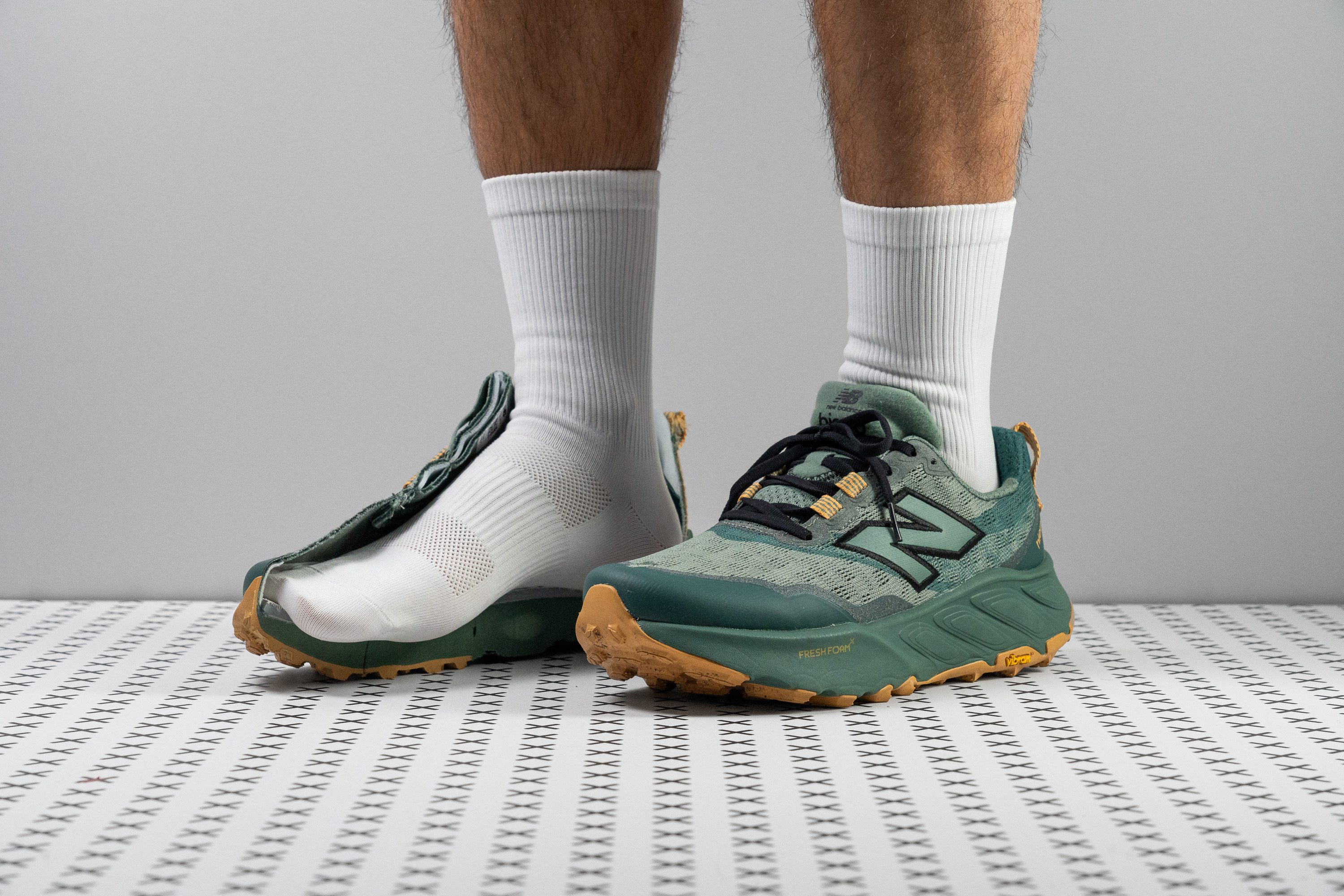Nuestra conclusión
Pros
- Montones de espuma bajo los pies
- Suela exterior Vibram Megagrip
- Mediasuela Fresh Foam X mejorada
- Estables
- Muy duraderas
- Ideales para largas distancias
- Disponible en varias anchuras
- Materiales de buena calidad
- Perfectas para corredores de metatarsos y de mediopié
Contras
- El ajuste no es muy espacioso
- Más pesadas que antes
- Perdieron su flexibilidad
- El drop bajo no se adapta a todo el mundo
Veredicto de los usuarios
- Top 7% más vendidas zapatillas de running
Comparativa
Las zapatillas de running más parecidas
+ + Añadir unas zapatillas | |||||
|---|---|---|---|---|---|
| Puntuación global | 84 Buenas | 87 Notables | 89 Notables | 77 Aceptables | |
| Precio | 160 € | 180 € | 170 € | 200 € | |
| Terreno de trail | Sencillo | Moderado | Sencillo | Sencillo | |
| Absorción de impactos | Alta | Moderada | Moderada | - | |
| Retorno de energía | Moderado | Moderado | Moderado | - | |
| Tracción | - | - | Alta | - | |
| Arch support | Neutral | Neutral | Neutral | Neutral | |
| Peso laboratorio Peso marca | 10.9 oz / 309g 10.5 oz / 297g | 10.7 oz / 302g 10.7 oz / 303g | 11 oz / 312g 10.9 oz / 309g | 11.7 oz / 332g 11.6 oz / 329g | |
| Drop laboratorio Drop marca | 4.2 mm 4.0 mm | 4.0 mm 4.0 mm | 6.5 mm 6.0 mm | 3.9 mm 4.0 mm | |
| Técnica de carrera | Medio/antepié | Medio/antepié | Medio/antepié | Medio/antepié | |
| Talla | Media talla más pequeñas | Tallan bien | - | Tallan un poquito pequeño | |
| Rigidez de la mediasuela | Blanda | Blanda | Blanda | Blanda | |
| Diferencia de la rigidez de la mediasuela en frío | Pequeña | Pequeña | Normal | Normal | |
| Durabilidad de la parte delantera | Buena | Buena | Decente | Muy buena | |
| Durabilidad del acolchado del talón | Alta | Alta | Baja | Media | |
| Durabilidad de la suela exterior | Buena | Buena | Decente | Buena | |
| Transpirabilidad | Media | Media | Media | Media | |
| Anchura / ajuste | Media | Media | Media | Estrecha | |
| Anchura de la parte delantera | Media | Ancha | Media | Estrecha | |
| Flexibilidad | Rígida | Moderada | Moderada | Rígida | |
| Rigidez torsional | Rígidas | Rígidas | Rígidas | Rígidas | |
| Rigidez del contrafuerte del talón | Moderado | Flexible | Rígido | Moderado | |
| Profundidad del dibujo de la suela | 3.3 mm | 4.0 mm | 3.5 mm | 4.0 mm | |
| Altura de la suela en la zona del talón laboratorio Altura de la suela en la zona del talón marca | 37.3 mm 33.0 mm | 30.3 mm 36.0 mm | 37.6 mm 36.0 mm | 35.6 mm 35.0 mm | |
| Antepié laboratorio Antepié marca | 33.1 mm 29.0 mm | 26.3 mm 32.0 mm | 31.1 mm 30.0 mm | 31.7 mm 31.0 mm | |
| Anchuras disponibles | EstándarAnchoExtra Ancho | Estándar | Estándar | Estándar | |
| Estación | Todas las estaciones | Todas las estaciones | Todas las estaciones | Todas las estaciones | |
| Removable insole | ✓ | ✓ | ✓ | ✓ | |
| Orthotic friendly | ✓ | ✓ | ✓ | ✓ | |
| Clasificación | #237 38% inferior | #145 Top 38% | #117 Top 31% | #345 9% inferior | |
| Popularidad | #24 Top 7% | #102 Top 27% | #195 49% inferior | #206 46% inferior |
Quién debería comprárselas
Después de darles caña a las Hierro v9 en los senderos y en el laboratorio, creemos que son:
- Un sueño hecho realidad para los fans de la serie Hierro que querían más amortiguación bajo los pies: esta versión por fin lo consigue.
- Ideales para los amantes del trail running que están buscando unas zapatillas maximalistas con amortiguación y duraderas diseñadas para las distancias largas.
- Fantásticas para los corredores de mediopié y de metatarsos, que tienen una espuma mejorada en el antepié y un drop bajo que se siente naturalmente eficiente.
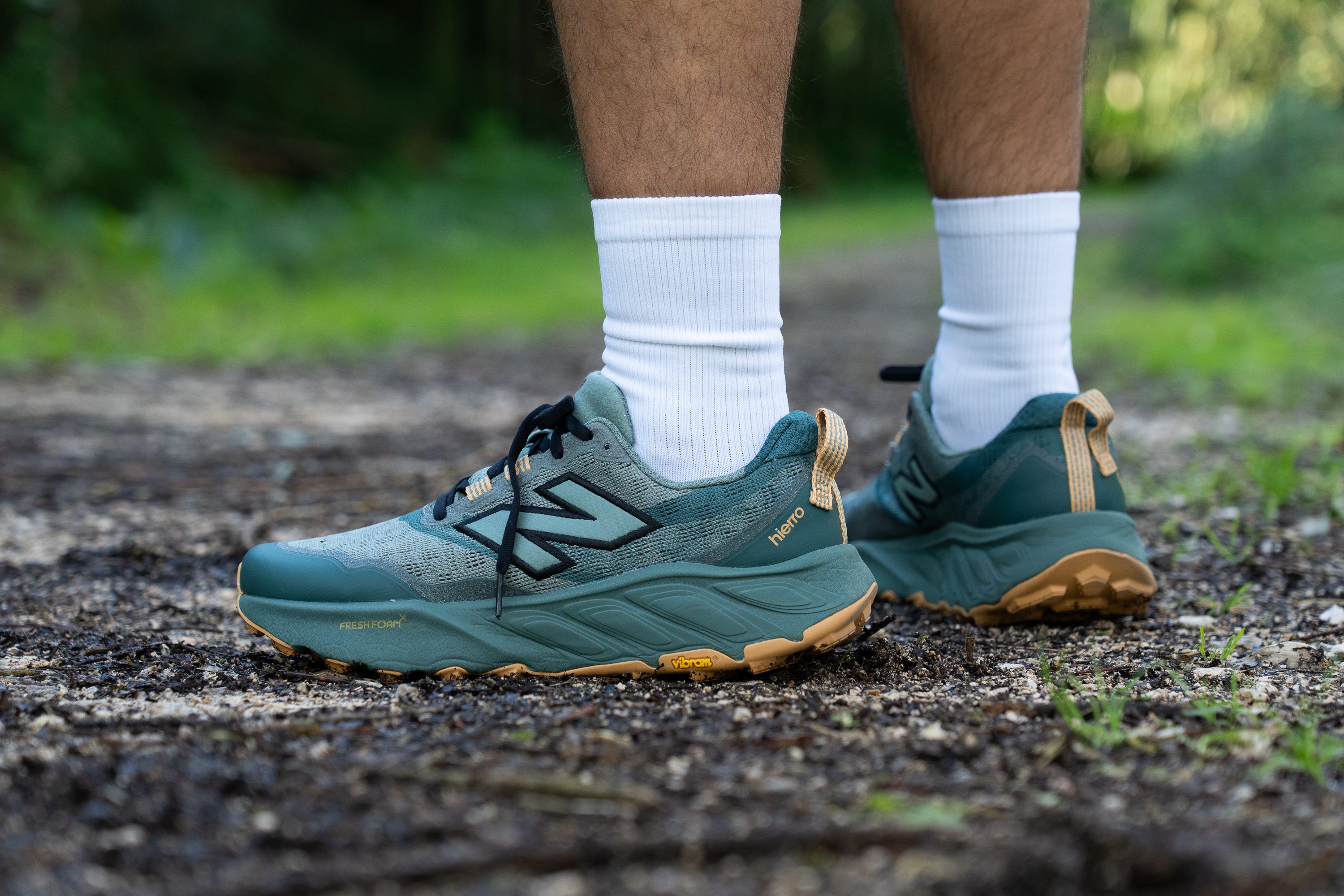
Quién NO debería comprárselas
Creemos que las Hierro v9 no son la mejor opción para los corredores a los que les gustaba la flexibilidad de las versiones anteriores. Ahora son unas zapatillas de trail rígidas que cambian el movimiento natural por una amortiguación máxima. En nuestra opinión, hay otros modelos como las Nike Pegasus Trail 5 o las Hoka Challenger 7 que se sienten mucho más naturales.
Además, también creemos que el drop de 4,2 mm podría ser un problema para algunos talonadores, ya que es un gran cambio en comparación con el diseño anterior. Probablemente estarán más cómodos con las Brooks Caldera 7 o incluso con las Merrell Moab Flight, que tienen un drop altísimo.
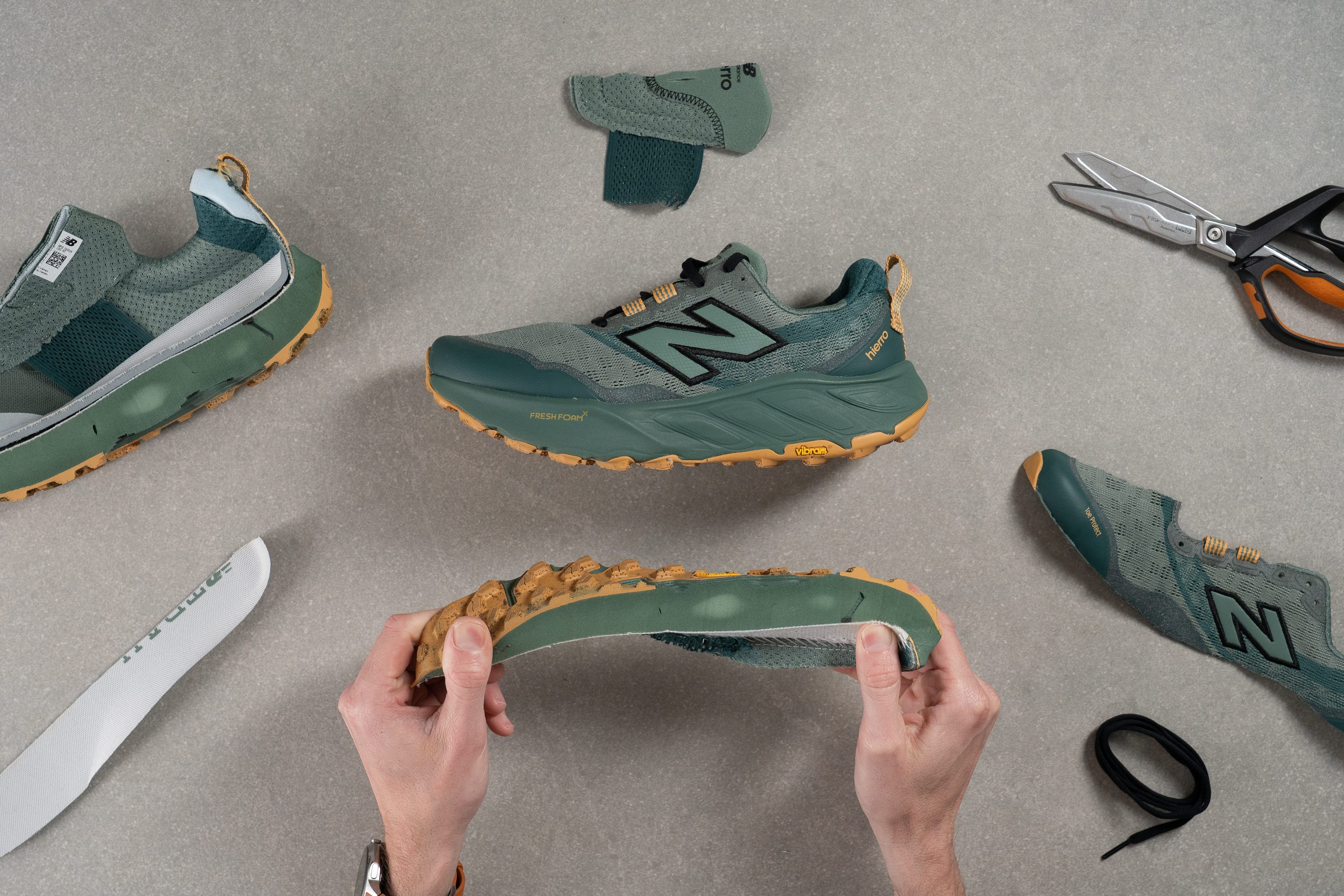
Amortiguación
Shock absorption
En cuanto corrimos por primera vez con las Hierro v9, sentimos que (incluso con la misma marca Fresh Foam X) la mediasuela era mejor en todo.
La absorción de impactos de este modelo es excepcional, ya que se llevó un estupendo resultado de 131 SA en el talón y de 124 SA en el antepié, lo que hace que sea una buena opción para los corredores de metatarsos o de mediopié que se enfrentar a distancias largas.
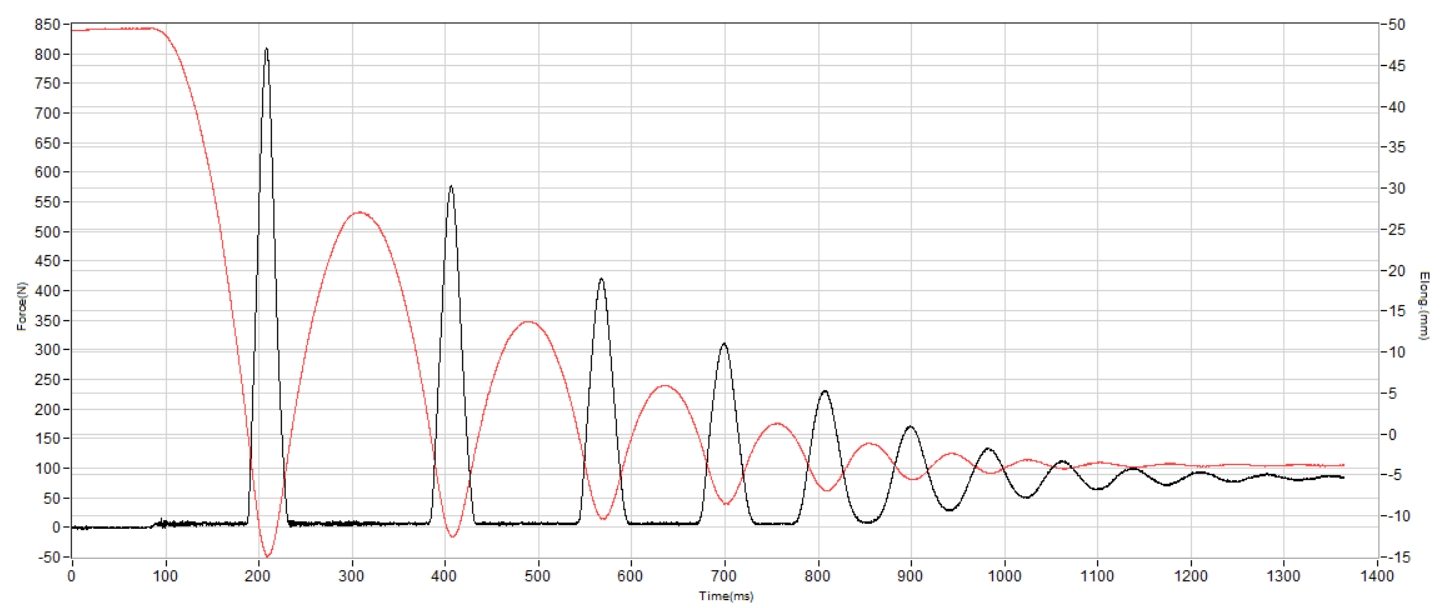
| Fresh Foam X Hierro v9 | 131 SA |
| Media | 122 SA |
Energy return
También sentimos que estas zapatillas estaban más vivas, sobre todo a ritmos rápidos, y lo confirmamos en el laboratorio. Su retorno de energía alcanza el 61,9 %, superando a la media y haciendo que las Hierro v9 estén entre los modelos de trail más reactivos del año.
| Fresh Foam X Hierro v9 | 61.9% |
| Media | 55.3% |
Altura de la suela en la zona del talón
Con 37,3 mm en el talón, las New Balance Fresh Foam X Hierro v9 ya no forman parte de la categoría estándar, al menos por ahora. Resulta que son 5,1 mm más altas que las Hierro v8, lo que hace que estén cerca del límite de los 40 mm, una altura a la que solo unas pocas zapatillas de trail se acercan (de momento).
Nos parece una gran ventaja para los corredores pesados o para los talonadores extremos, sobre todo en las rutas de larga distancia. Eso sí, también se siente menos el suelo bajo los pies, y esa rigidez no le va a gustar a todo el mundo.
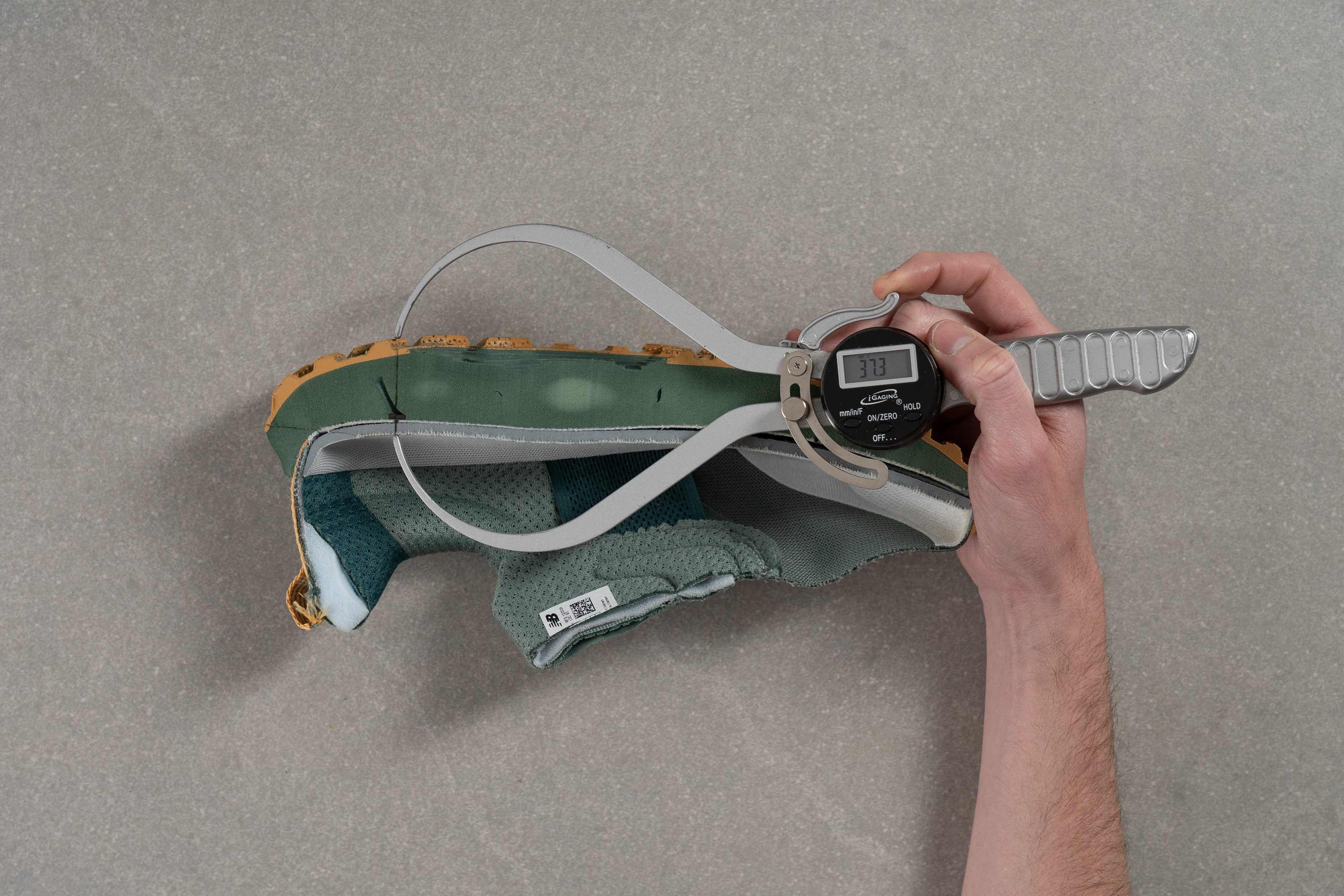
| Fresh Foam X Hierro v9 | 37.3 mm |
| Media | 32.6 mm |
Altura de la suela en el antepié
La zona que más cambia es el antepié. ¡Menuda locura! Cuando analizamos las Hierro v7, medían 22,5 mm en esta zona, y las Hierro 8 alcanzaban los 24,1 mm, acercándose más a la media.
Ahora hemos saltado hasta los 33,1 mm, que es un aumento del 37 %. La verdad es que no solemos ver estos cambios tan grandes en nuestro laboratorio, ni siquiera teniendo en cuenta todas las zapatillas que analizamos al año.
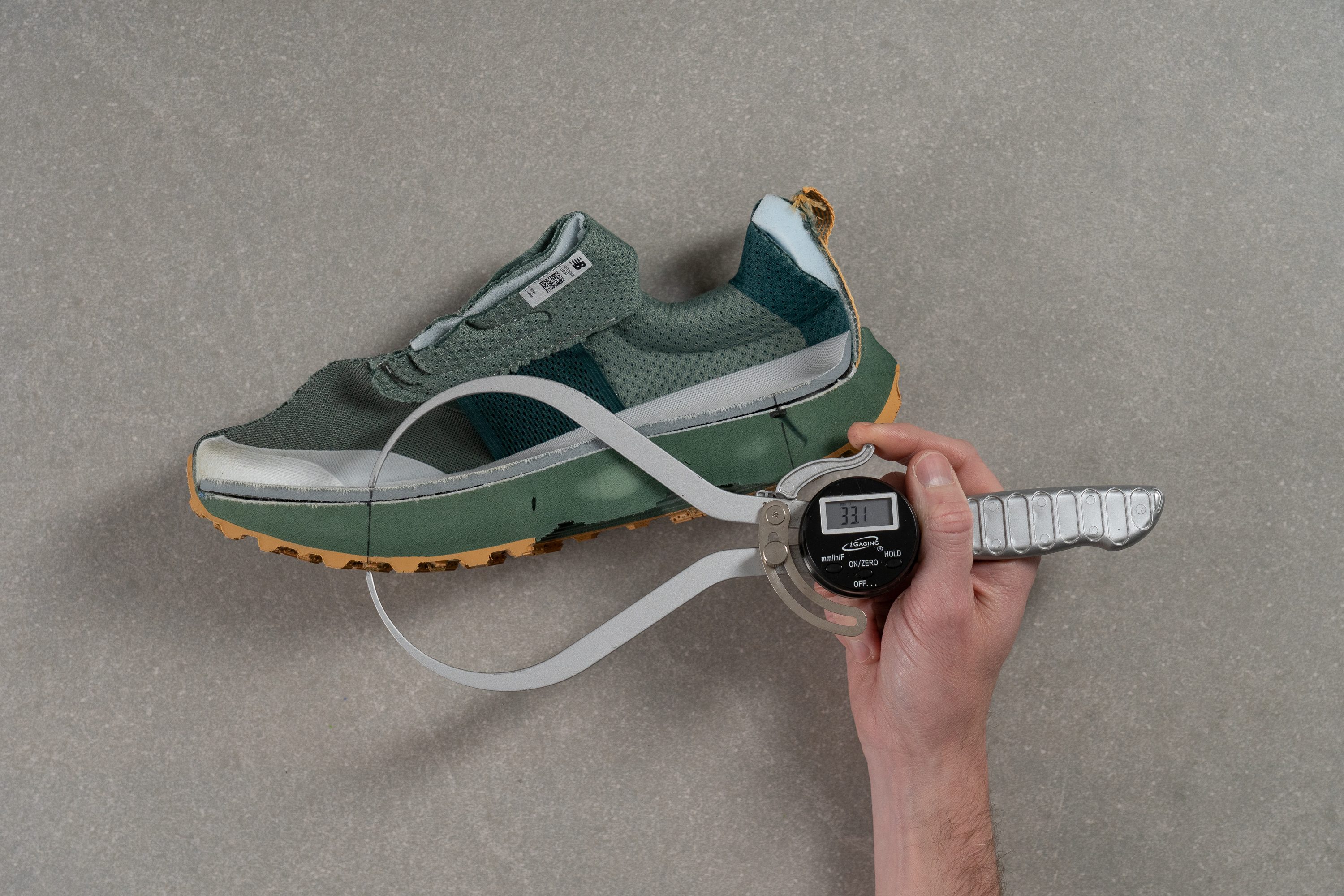
| Fresh Foam X Hierro v9 | 33.1 mm |
| Media | 25.1 mm |
Drop
Cuando medimos el drop pudimos confirmar que New Balance está remodelando la serie Hierro. Antes eran unas zapatillas de trail con un drop alto, pero ahora son básicamente lo contrario.
Con solo 4,2 mm, el drop se adapta mejor a los corredores de mediopié y de metatarsos. En nuestra opinión, es probable que esto no les guste tanto a los talonadores, ya que las Altra 9 son más como unas Altra o unas Topo
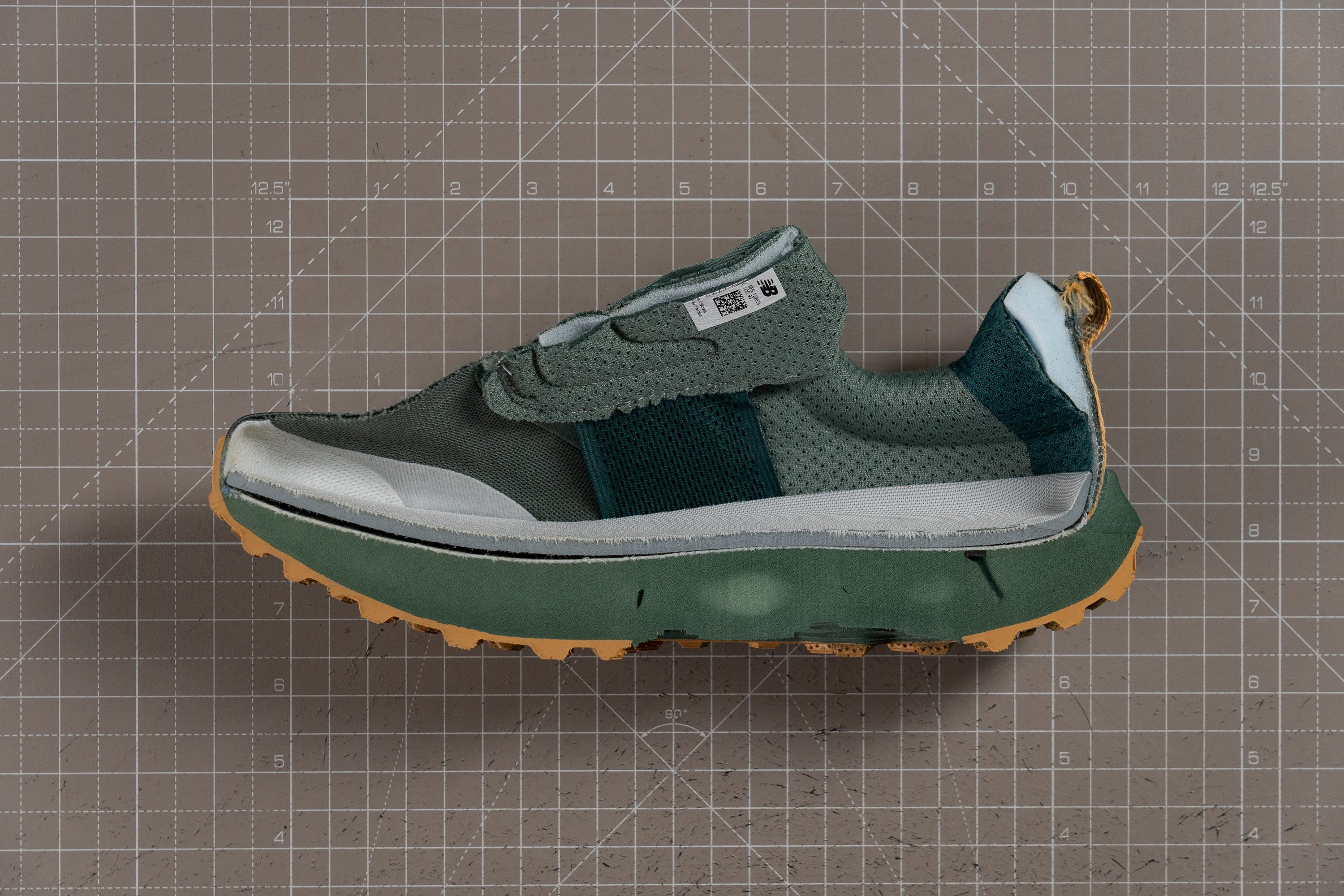
| Fresh Foam X Hierro v9 | 4.2 mm |
| Media | 7.6 mm |
Dureza de la mediasuela
ActualizadoComo se apellidan Fresh Foam X, estas zapatillas claramente iban a tener una mediasuela blandita como una nube. Pero... con las zapatillas de trail siempre existe la posibilidad de que la espuma sea más bien firme para mantener la estabilidad.
Por eso nos pareció adecuado el resultado de 29,7 AC que marcó nuestro durómetro cuando analizamos las Hierro v9. En nuestras pruebas nos pareció bastante protectora sin ser demasiado blanda, una excelente combinación para ofrecerte comodidad en largas distancias y eventos de ultradistancia.
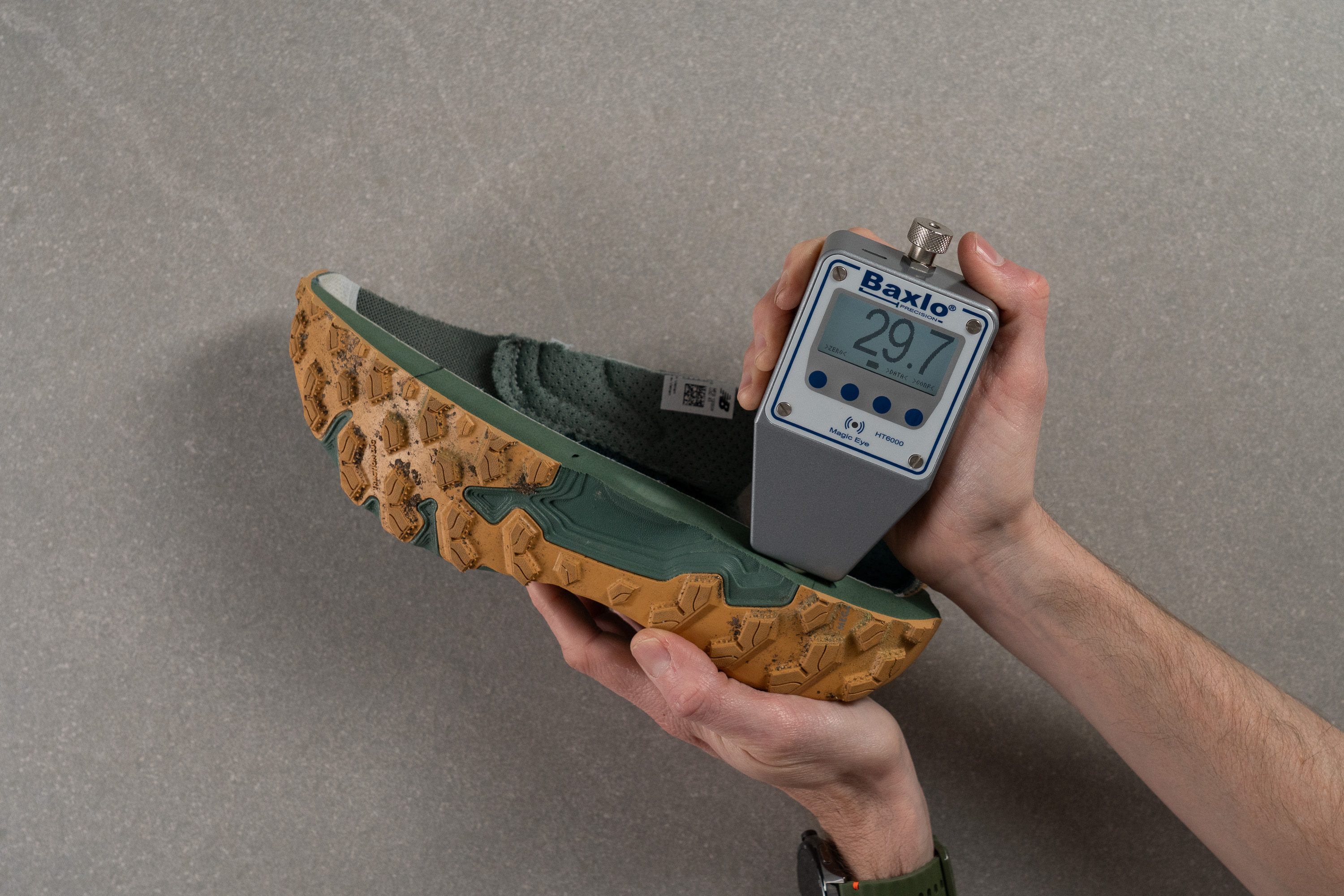
| Fresh Foam X Hierro v9 | 29.7 AC |
| Media | 37.5 AC |
Rocker
En nuestro laboratorio hemos descubierto que muchas marcas recurren a las mediasuelas con rocker para compensar la rigidez que añade el extra de espuma, sobre todo si la altura de la suela en el antepié supera los 30 mm. Vamos, que las Hierro v9 son unas claras candidatas para esto.
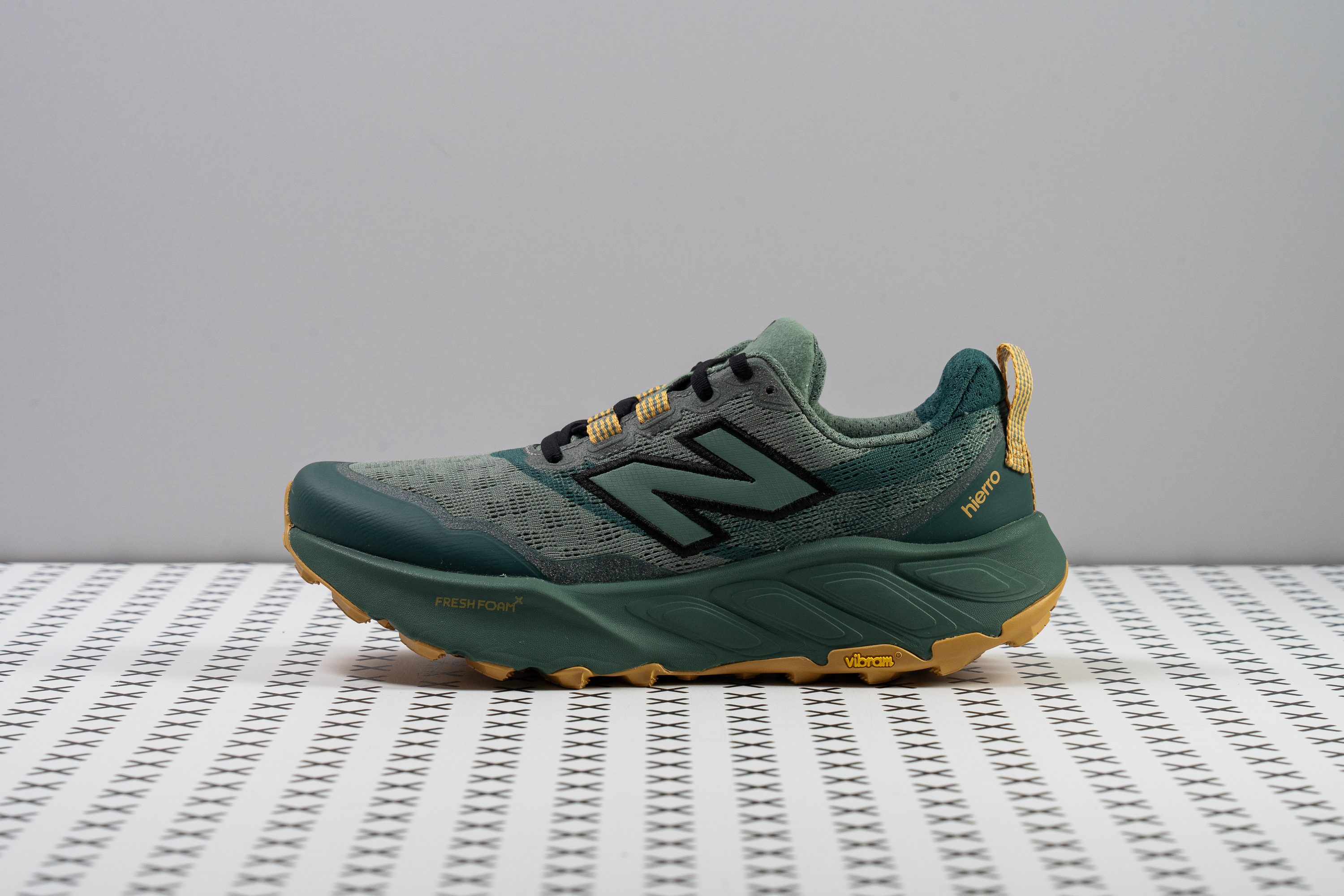
Fieles a nuestras expectativas, las Hierro ya no son unas zapatillas planas. Tanto el talón como el antepié tienen un rocker que nos echa una mano en cada paso, impulsándonos hacia adelante, aunque también es cierto que se sienten un poco menos naturales.
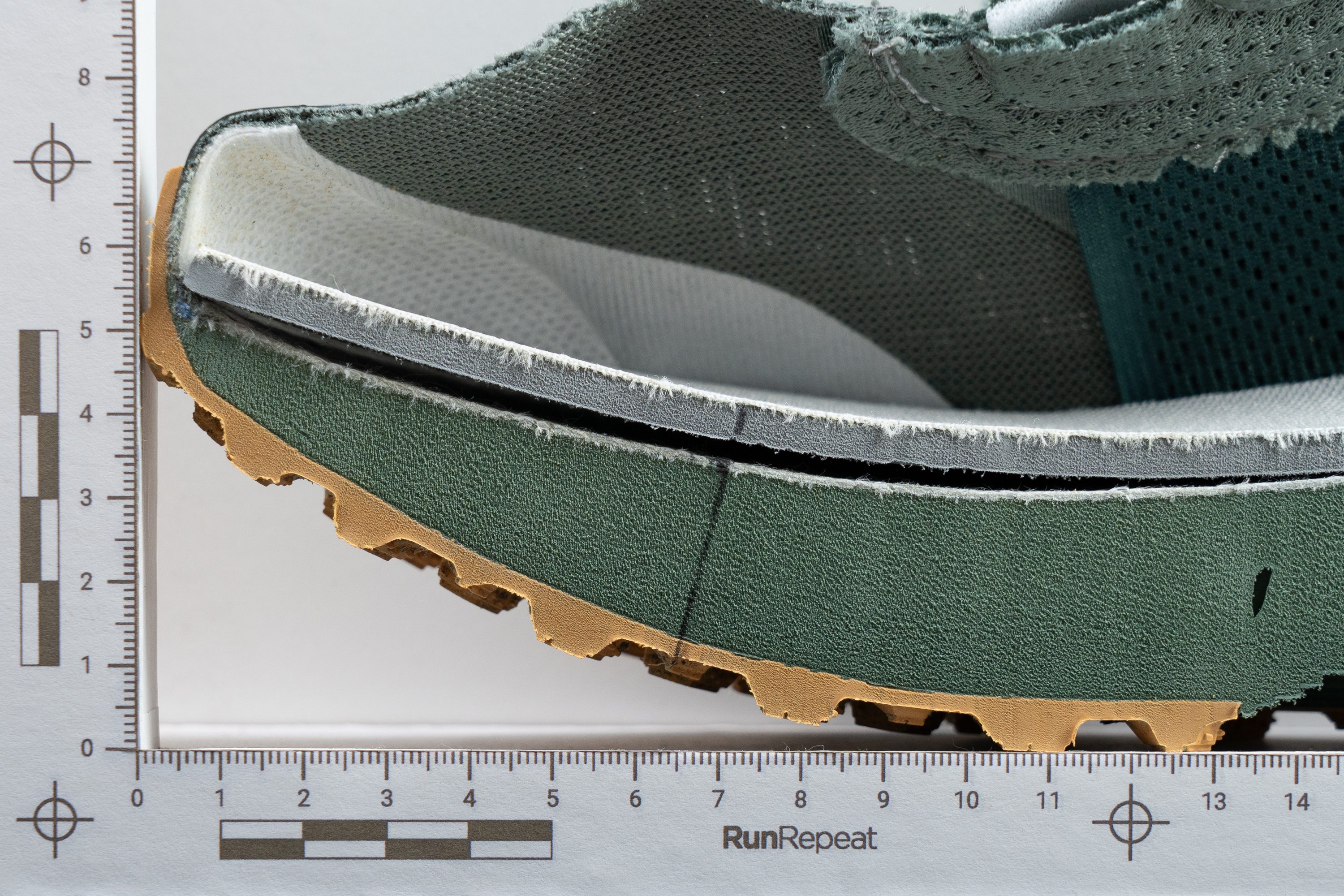
Tallaje y ajuste
Talla
Las New Balance Fresh Foam X Hierro v9 son media talla más pequeñas (109 votos).
Plantéate subir media talla
Anchura / Ajuste
Ya hemos visto que las Hierro v9 tienen mucha más espuma bajo los pies. Pero..., ¿cómo son por dentro? A esta pregunta no nos puede contestar nadie más que el protagonista de esta prueba: ¡nuestro gel patentado!
Empezando por la parte más ancha... no tenemos muy buenas noticias para los corredores con pies anchos. Nuestro calibre marcó 94,7 mm, que es un resultado que se corresponde con un ajuste estándar... o incluso un poquito ajustado.
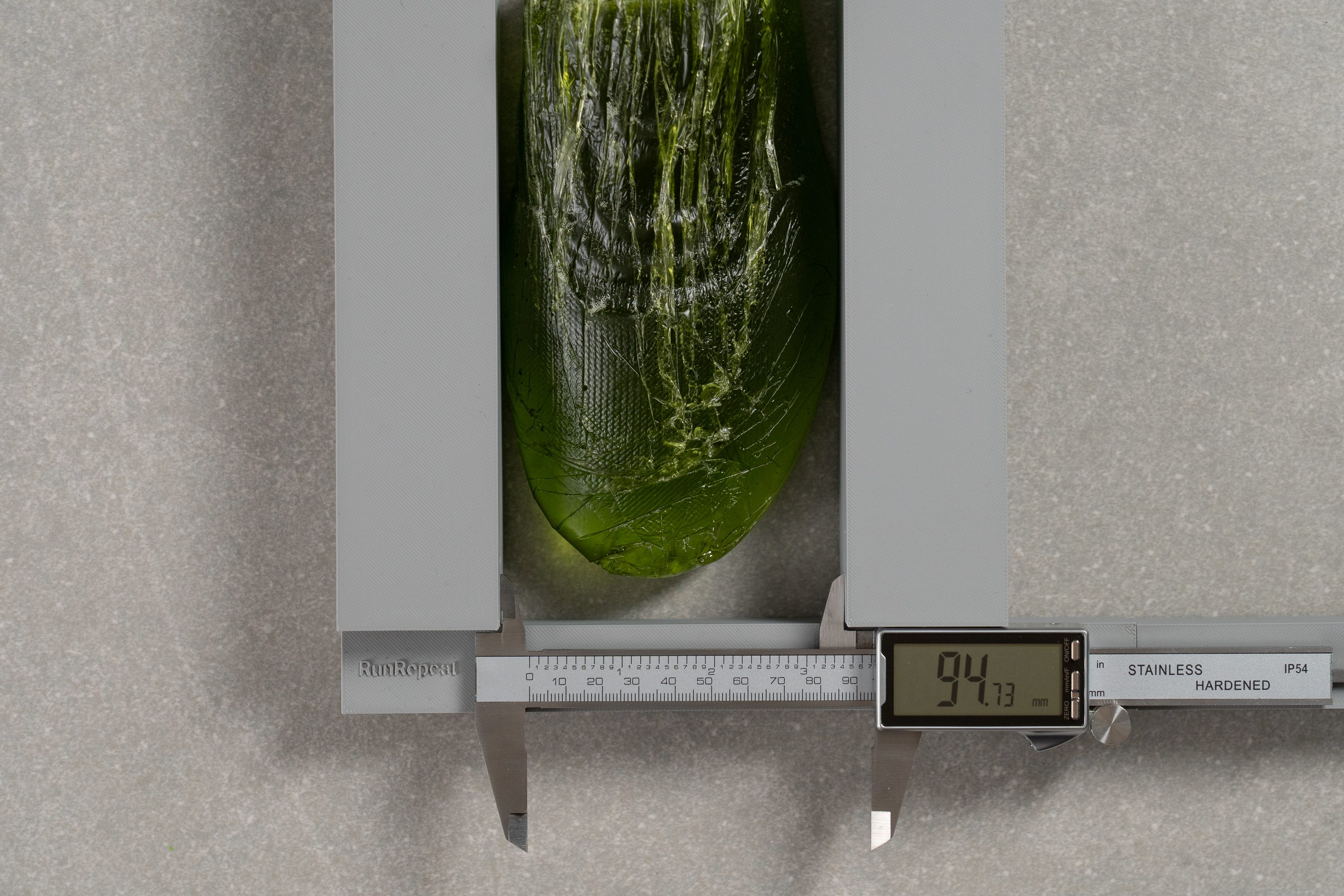
| Fresh Foam X Hierro v9 | 94.7 mm |
| Media | 95.6 mm |
Anchura de la parte delantera
Vimos que la zona del dedo gordo sigue el mismo camino, ya que se estrecha bastante hacia la punta. Nuestro calibre marcó 73,4 mm, que es un resultado por debajo de la media. Incluso así, no podemos decir que la parte delantera sea estrecha.
Pero mucho ojo, ¡que hay truco! En algunas tiendas, New Balance vende este modelo en anchuras distintas. Vamos, que si tienes los pies anchos, puedes ir a por su versión 2E o incluso 4E si está disponible.
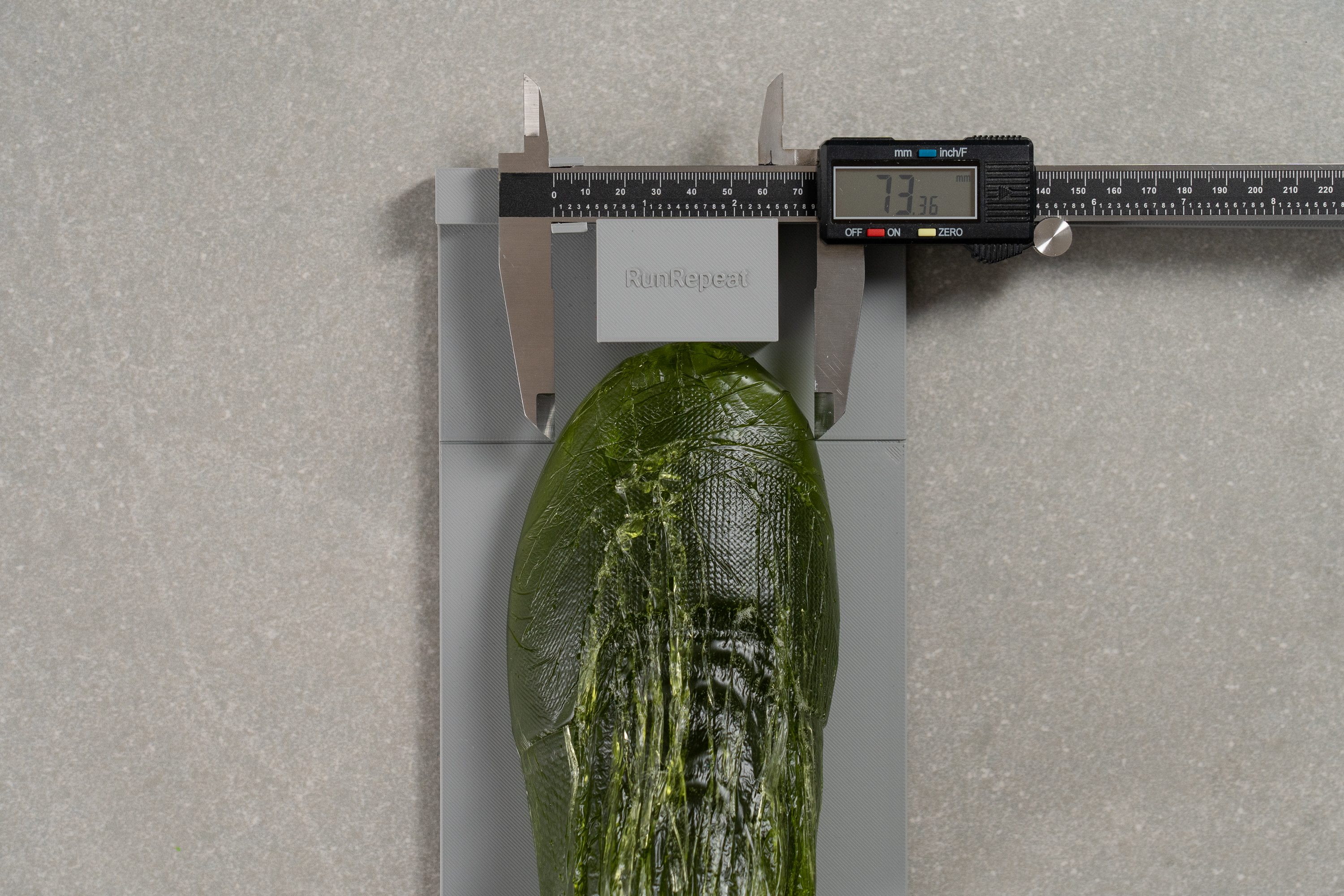
| Fresh Foam X Hierro v9 | 73.4 mm |
| Media | 74.6 mm |
Altura de la parte delantera
También queríamos comprobar el espacio vertical para los dedos de los pies, algo que nuestro método de gel también puede medir con mucha precisión.
Nos dio 26,7 mm, un resultado estándar que se debería adaptar bien a la mayoría de corredores. La verdad es que nos parece una decisión prudente en cuanto a diseño por parte de New Balance.
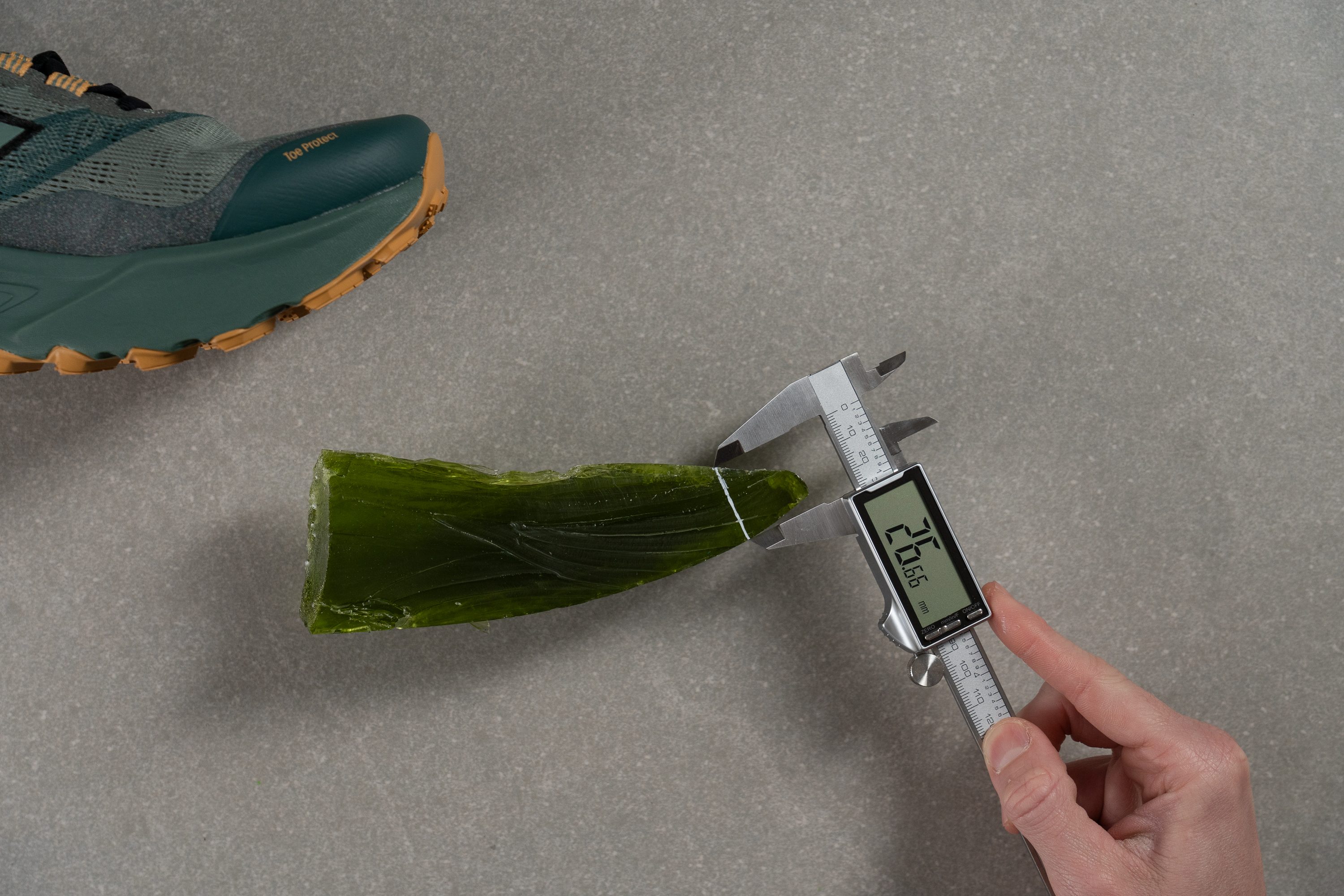
| Fresh Foam X Hierro v9 | 26.7 mm |
| Media | 27.0 mm |
Tracción / Agarre
Tracción en el antepié
Teníamos algunas dudas sobre la tracción, sobre todo después de que las Hierro v8 se llevasen un modesto 0,33 en esta prueba. Sin embargo, las Hierro v9 consiguieron impresionarnos tanto en nuestras rutas con ellas como en el laboratorio, obteniendo un maravilloso 0,52.
| Fresh Foam X Hierro v9 | |
| Media | 0.61 |
Profundidad del dibujo de la suela
Las Hierro v9 tienen tacos de una profundidad moderada. Con 3,3 mm, claramente están diseñadas para los senderos sencillos y conocidos, alejándose de los terrenos salvajes y técnicos.
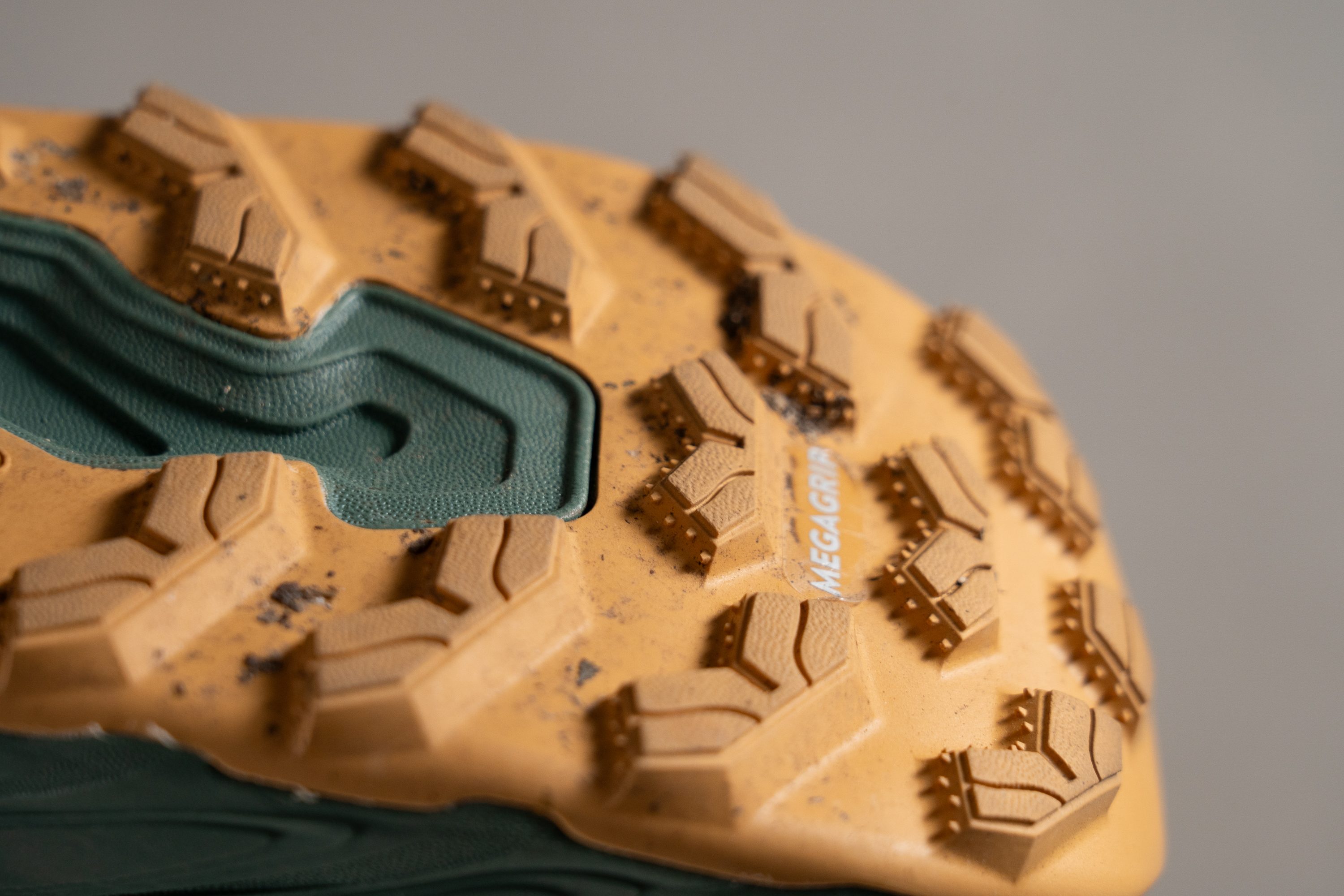
En nuestra experiencia, la combinación del compuesto Megagrip de Vibram y los tacos con bordes dentados hacen que el agarre de estas zapatillas sea ideal sobre gravilla, tierra e incluso un poco de barro. Es una suela exterior de primera para una dificultad moderada.
Eso sí, no te puedes llevar este par a cualquier sitio. El diseño de su suela destaca destaca en rutas distintas, pero no tiene la profundidad y la agresividad necesarias para las pendientes resbaladizas o los terrenos profundos e inestables.
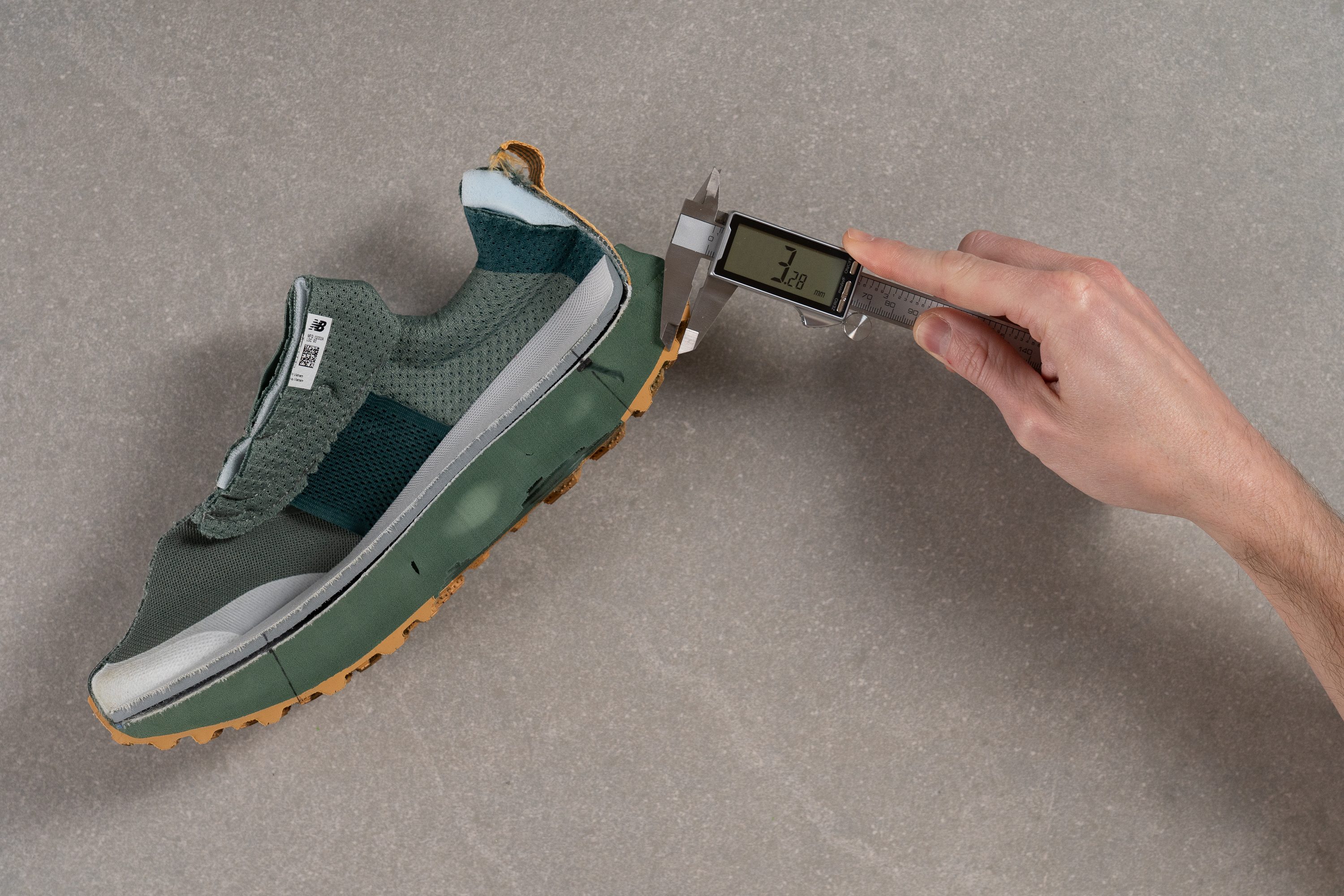
| Fresh Foam X Hierro v9 | 3.3 mm |
| Media | 3.5 mm |
Diseño de la suela exterior
New Balance ha confiado en el caucho Vibram para las Hierro, aunque ha ido cambiando de compuestos; a veces incluso utilizando el Eco-Step, que no nos gusta nada, como hizo en la versión 8. Por suerte, las Hierro v9 han vuelto con el Vibram Megagrip, lo que nos parece un gran acierto.
Las Hierro v9 tienen una suela completa de Vibram Megagrip con un diseño de caucho bicolor en tonos marrón terroso y verde. Sus tacos multidireccionales están muy separados y tiene zonas con relieve en el talón y en el antepié. Además, hay un gran corte de espuma expuesta en el mediopié que reduce el peso.
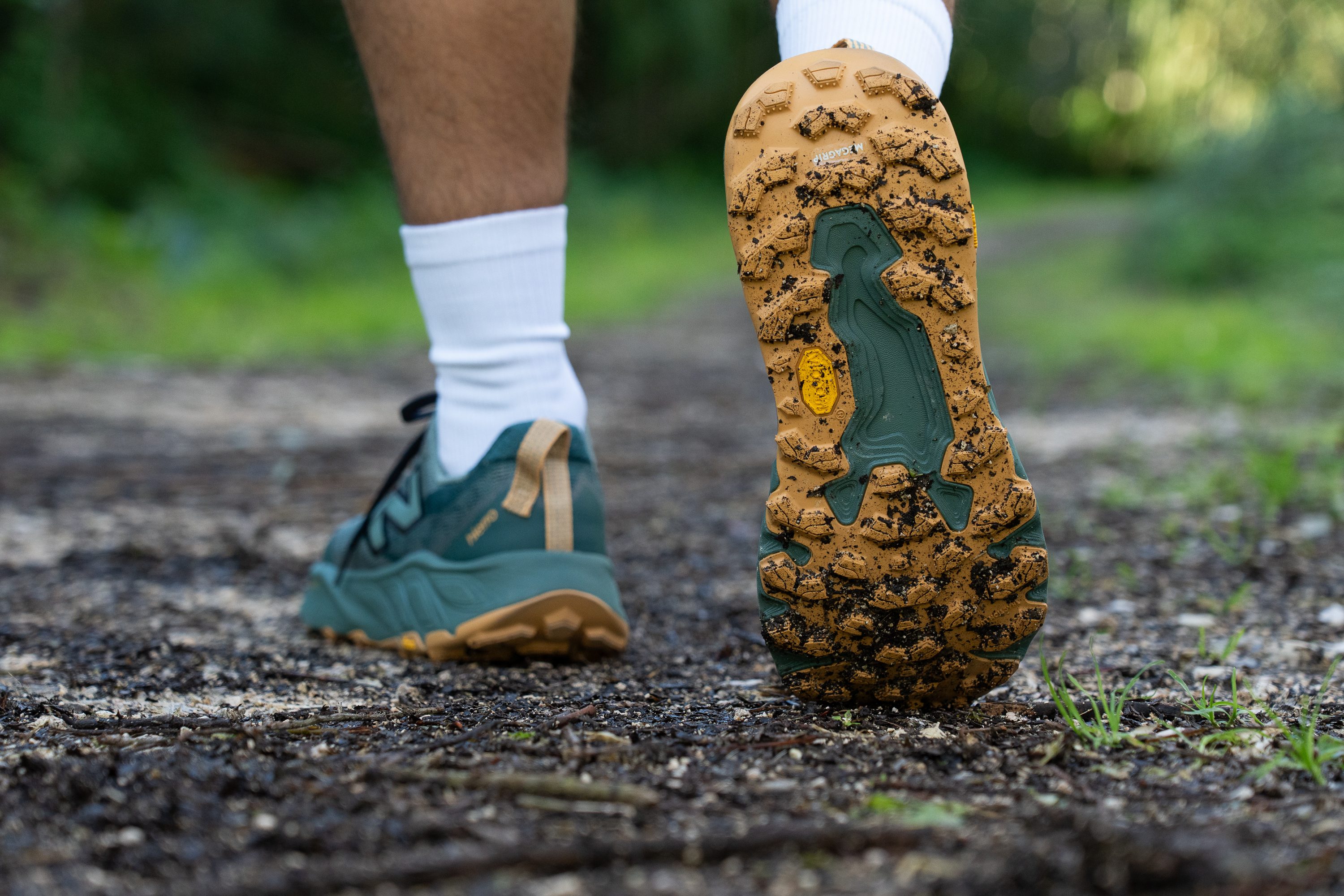
Flexibilidad / Rigidez
Además de tener una estructura con una rigidez torsional muy alta, la rigidez longitudinal de este modelo también representa un cambio drástico. Vamos, que si te gustaba la sensación flexible y natural de las versiones anteriores, esto no te va a gustar ni un pelo.
En nuestro test de flexión, necesitamos 18,2 N de fuerza para doblar estas zapatillas, que es mucho más de los 11,0 N que necesitamos en esta misma prueba cuando analizamos la v8. Vamos, ¡que son un 65 % menos flexibles!
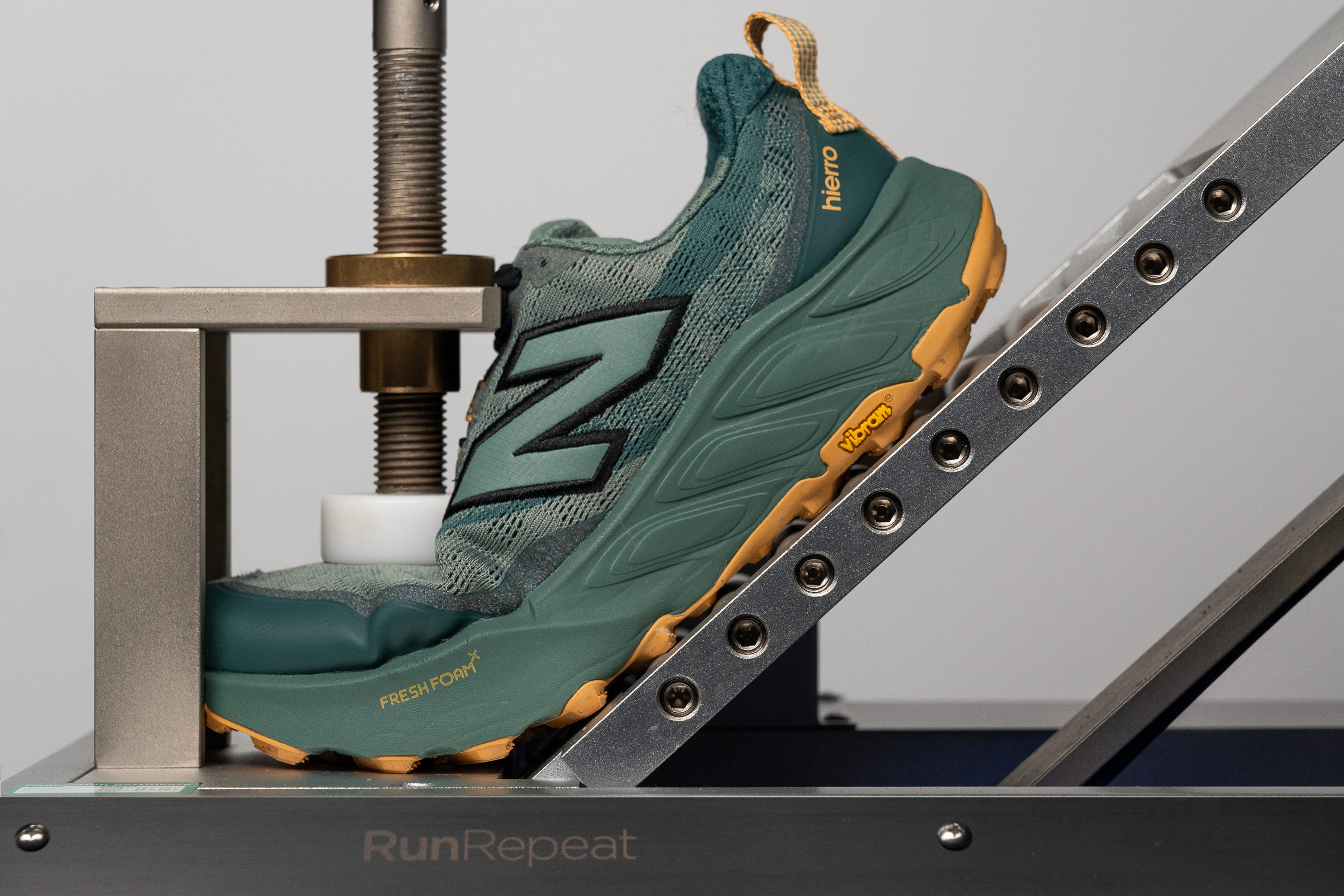
| Fresh Foam X Hierro v9 | 18.2N |
| Media | 14.6N |
Peso
Otra desventaja de esta actualización viene con el peso, que pasa de 298 g a 309 g. Aunque suene justo teniendo en cuenta que ahora hay más espuma y que la plataforma es más grande, siguen siendo gramos de sobra en unas zapatillas que ya de por sí eran pesadas.
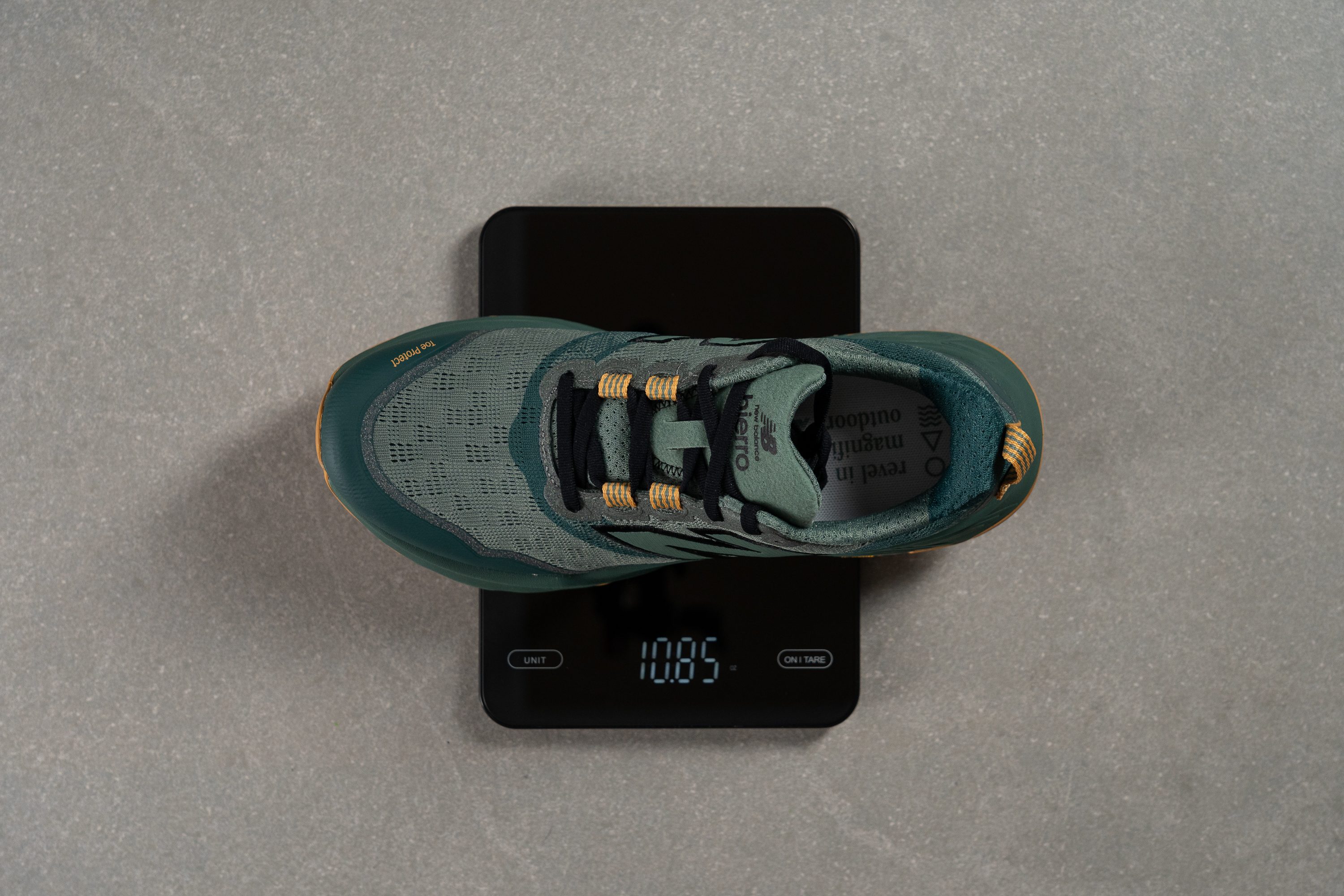
| Fresh Foam X Hierro v9 | 10.9 oz (309g) |
| Media | 10.2 oz (289g) |
Transpirabilidad
Hemos observado que New Balance ha hecho un esfuerzo digno de mención para mejorar la transpirabilidad de las Hierro v9. Se llevaron un 3/5 en esta prueba, que nos parece un resultado adecuado para irse de aventuras durante todo el año.
Cuando pusimos el upper frente a nuestra luz LED, vimos que tenía muchas aperturitas para el flujo de aire. Eso sí, el resto de las zapatillas tiene una estructura más gruesa que se centra en proporcionar estabilidad para contrarrestar la altura de la suela.
También utilizamos nuestro microscopio digital para examinar el diseño de la malla.
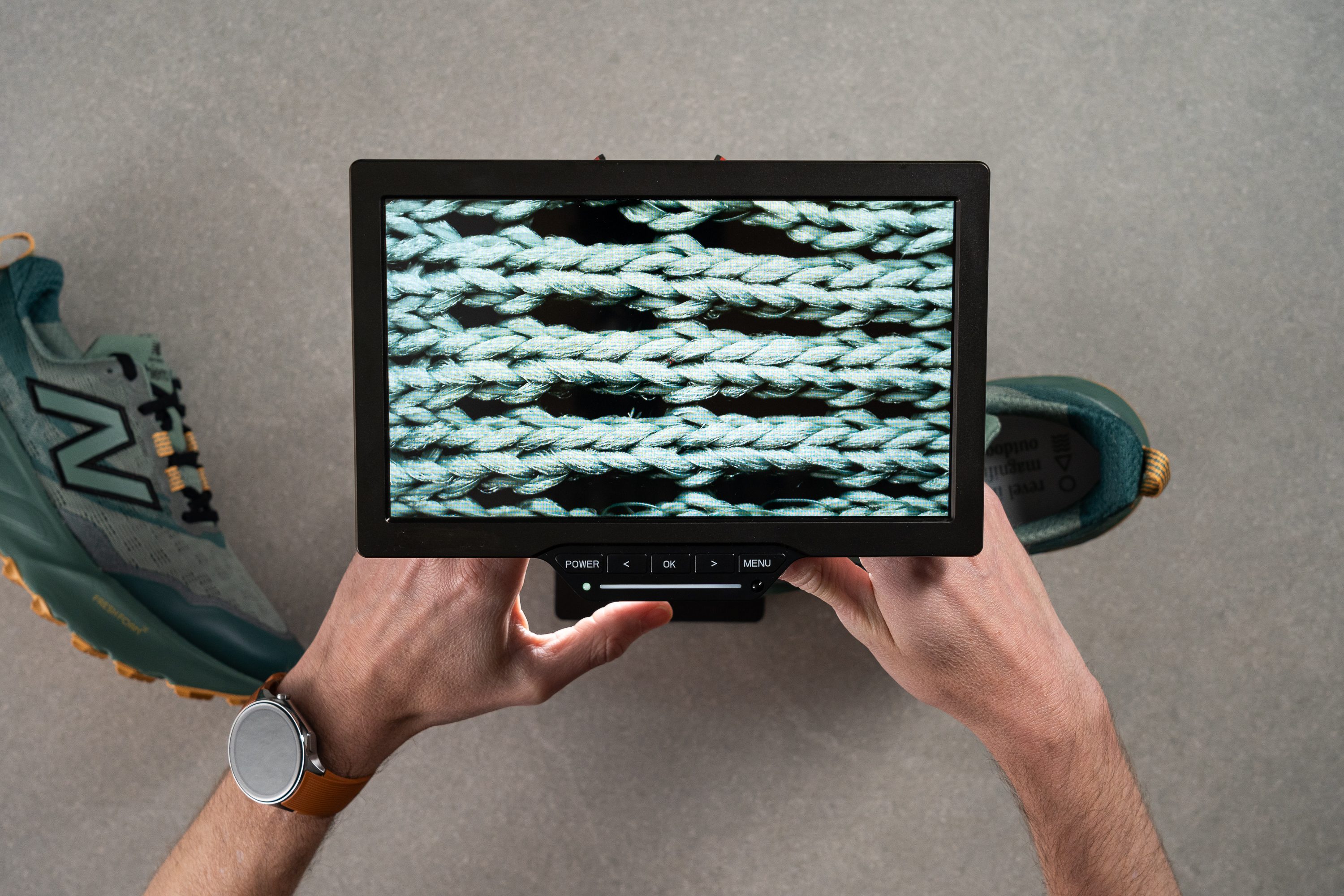
Resulta que, como decíamos, hay montones de agujeros de ventilación que dejan que el aire entre y salga. Eso sí, pueden afectar negativamente a la durabilidad.
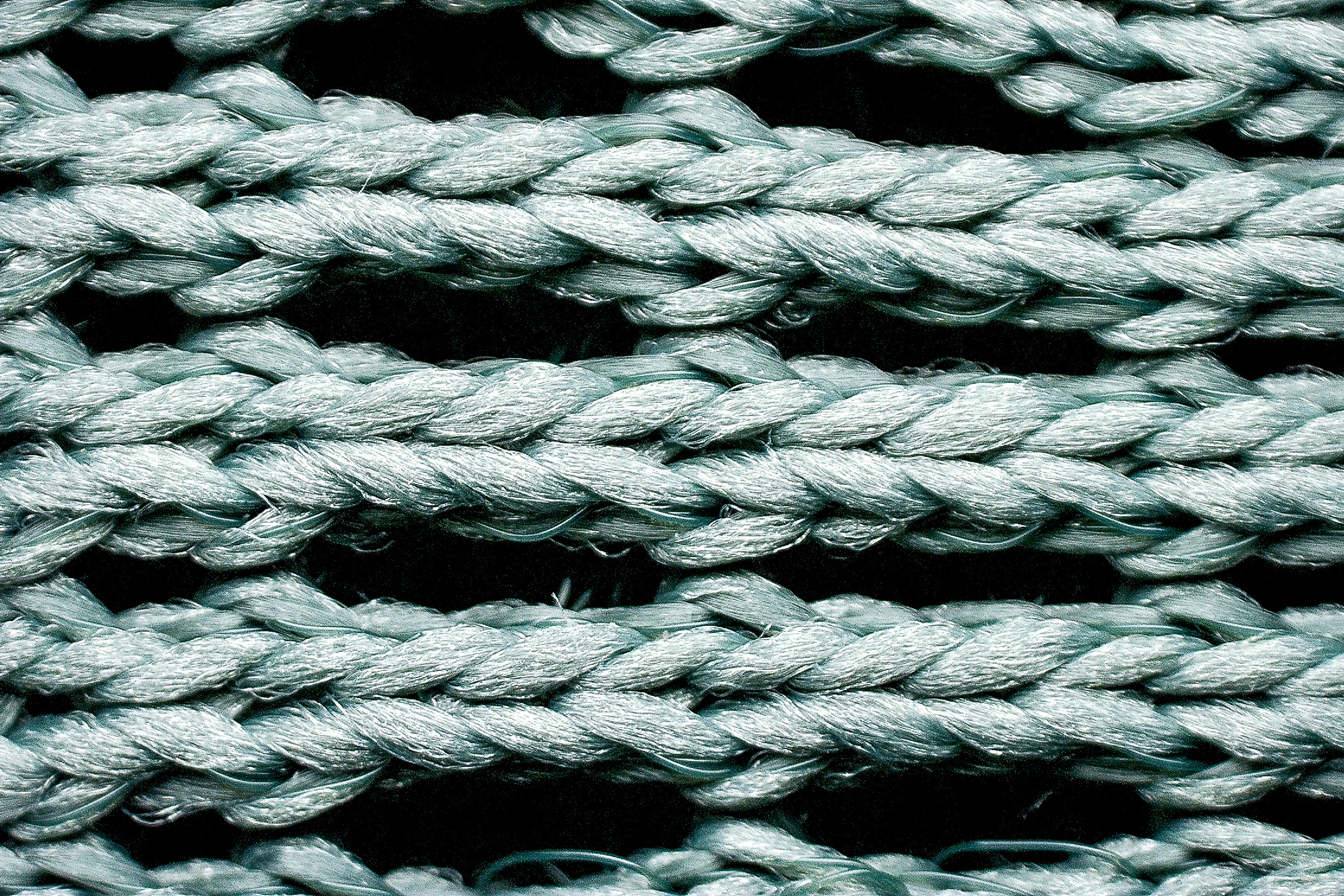
El upper en sí representa una mejora importante, ya que está muy bien acolchado en las zonas del talón y la lengüeta.
Da un poco de sí e incorpora refuerzos de TPU "Toe Protect" diseñados para evitar el desgaste prematuro en la parte delantera.
| Fresh Foam X Hierro v9 | 3 |
| Media | 3.3 |
Estabilidad
Prueba de estabilidad lateral
Algunos de vosotros os preguntaréis si la altura de la suela de las Hierro ha afectado a su estabilidad, así que dejadnos deciros que... ¡no! De hecho, la marca las ha rediseñado completamente para que su estabilidad sea decente, aunque tienen alguna desventaja que otra que os explicaremos más adelante.
Rigidez torsional
Uno de los mayores cambios en este modelo es su rigidez torsional. Las Hierro v8 y las versiones anteriores eran muy flexibles, pero es algo que ha cambiado en la versión 9, ya que se llevó un 5/5 en esta prueba de laboratorio.
Es un resultado que solemos ver en las zapatillas de competición con placa de carbono, así que imagínate lo rígidas que se sienten al caminar. Creemos que es una decisión que New Balance ha tomado para añadirle sujeción a la plataforma, que ahora es muy alta, pero que ha perdido la flexibilidad de las versiones anteriores.
| Fresh Foam X Hierro v9 | 5 |
| Media | 3.6 |
Rigidez del contrafuerte del talón
El contrafuerte del talón sigue siendo moderadamente flexible (se parece más al de los modelos para correr por asfalto de la marca), ya que se llevó un 3/5 en nuestra prueba de rigidez. Debería adaptarse bien a la mayoría de corredores, incluso a los que tienen talones sensibles o la deformidad de Haglund.
| Fresh Foam X Hierro v9 | 3 |
| Media | 3 |
Anchura de la mediasuela - antepié
La plataforma de las Hierro es más ancha, de eso no hay duda. Este es otro de los cambios clave que ayudaron a que la pisada siguiese siendo estable incluso con una suela tan alta. Cuando medimos su anchura en el antepié, nos dio 116,9 mm, y eso que la versión anterior solo alcanzaba 113,2 mm.
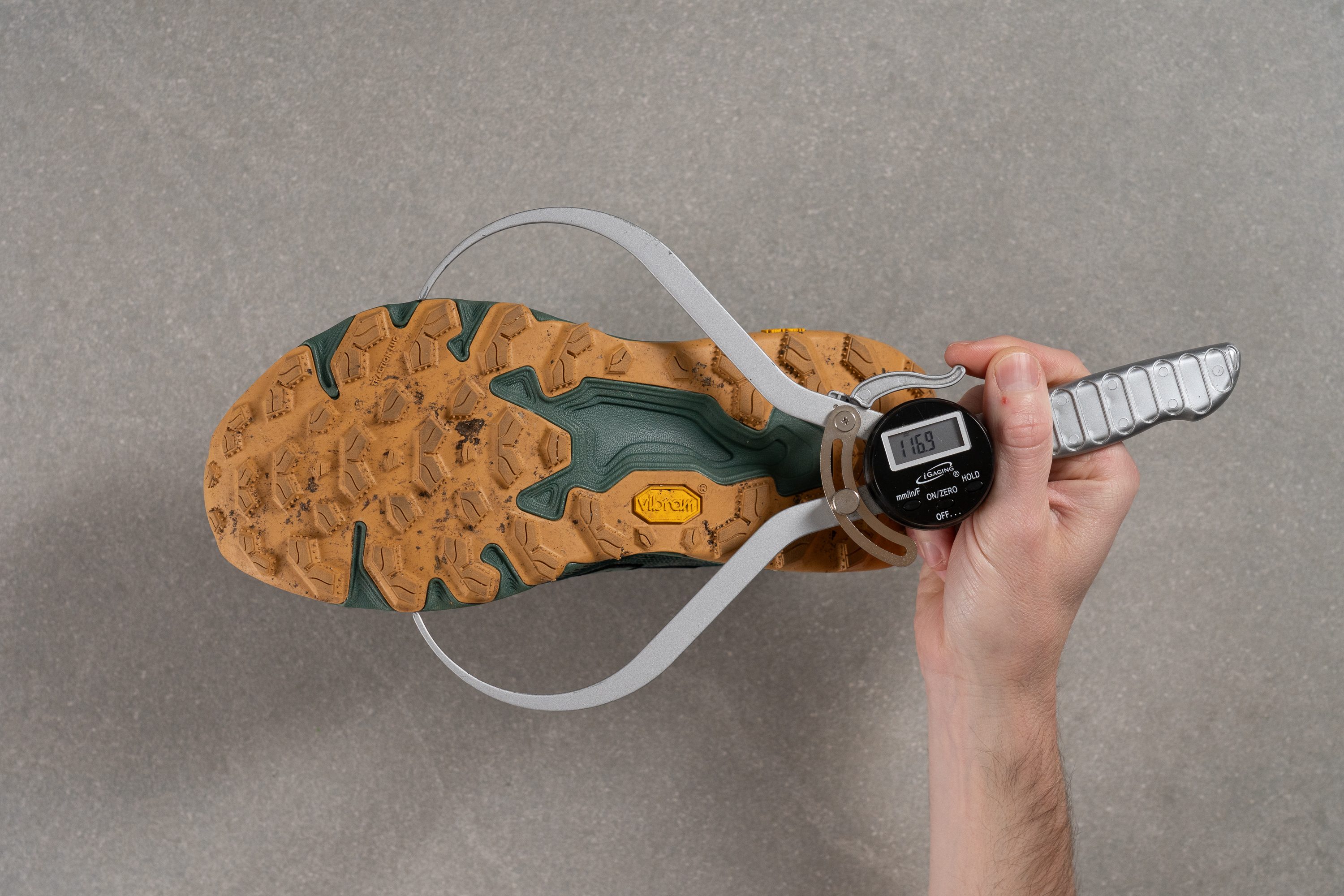
| Fresh Foam X Hierro v9 | 116.9 mm |
| Media | 112.8 mm |
Anchura de la mediasuela - talón
El talón también se ha ensanchado: ahora mide 94,1 mm, y la versión anterior 91,9 mm. No es un cambio drástico y apenas se nota bajo los pies, pero ya nos indica que las Hierro están dando pasitos hacia un futuro maximalista.
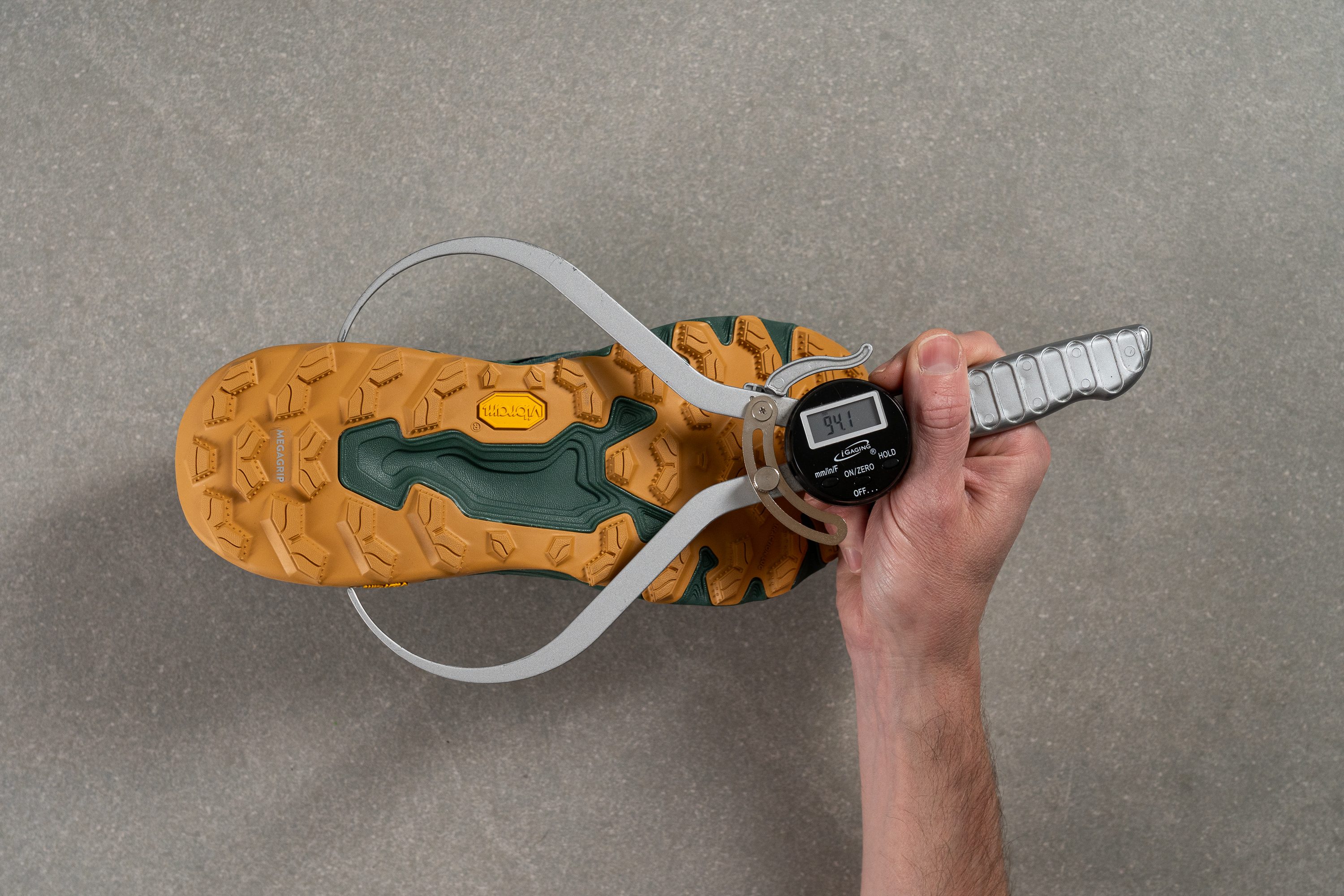
| Fresh Foam X Hierro v9 | 94.1 mm |
| Media | 89.9 mm |
Durabilidad
Durabilidad de la parte delantera
Fuimos a esta prueba con miedo, ya que la malla tienen un montón de agujeros para mejorar el flujo de aire, y son propensos a desgarrarse. Sin embargo, New Balance ha acertado eligiendo el material, así que este modelo se llevó un maravilloso 4/5.
| Fresh Foam X Hierro v9 | 4 |
| Media | 3.1 |
Durabilidad del acolchado del talón
No es fácil superar la puntuación de la parte delantera, pero las Hierro v9 lo consiguieron al obtener un impecable 5/5 en la prueba de acolchado del talón. Es una muy buena señal, así que esta zona no se desgastará fácilmente.
| Fresh Foam X Hierro v9 | 5 |
| Media | 3 |
Dureza de la suela
¿Y la suela exterior? Pues New Balance ha confiado siempre en Vibram para las Hierro, aunque ha alternado entre compuestos, a veces incluso utilizando el decepcionante Ecostep... que es incluso peor si lo comparas con el fantástico Megagrip.

Por suerte, las Hierro v9 han vuelto con el Vibram Megagrip, que creemos que es una gran victoria.
En nuestra opinión, Megagrip es el ejemplo a seguir en el trail running, ya que se llevó un firme resultado de 88,6 HC. Vamos, que sin duda va a ser duradero, además de que también promete un agarre estupendo incluso en terrenos escarpados.
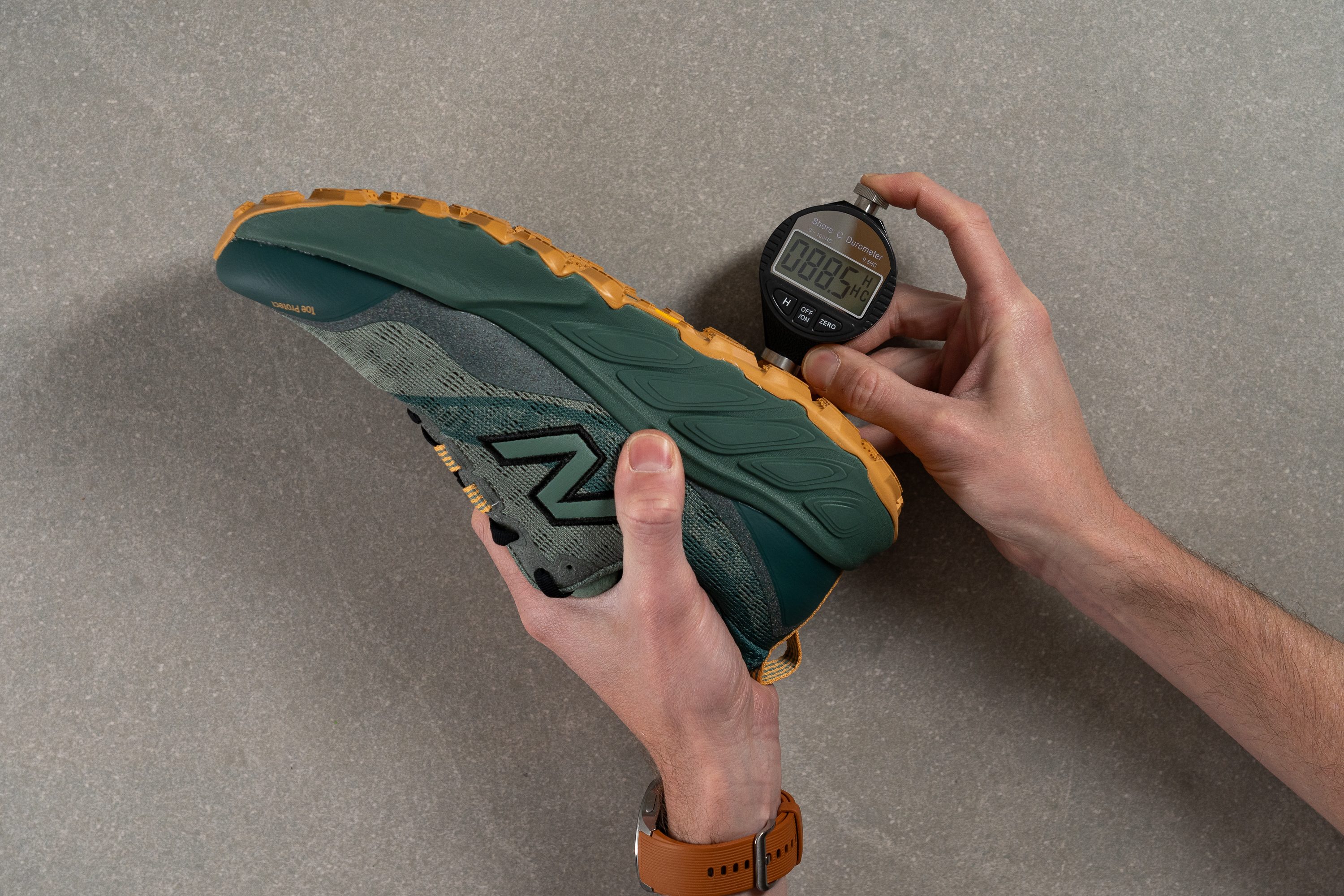
| Fresh Foam X Hierro v9 | 88.6 HC |
| Media | 85.8 HC |
Durabilidad de la suela
Nuestra tercera prueba con el Dremel tampoco estuvo mal, ya que cuando medimos los daños nos dio 0,9 mm. No es nada que nos deje boquiabiertos, pero nos parece lo suficientemente bueno como para poder decir que no hay riesgo de que la suela exterior termine destrozada antes de tiempo.
| Fresh Foam X Hierro v9 | 0.9 mm |
| Media | 0.9 mm |
Grosor de la suela
La suela exterior también es lo suficientemente gruesa como para proteger los pies de los terrenos abruptos o irregulares, ya que mide 2,4 mm. Esto ayuda a explicar por qué las Hierro se sienten un poco más firmes en los pies de lo que nos esperábamos, sobre todo teniendo en cuenta el resultado que marcó nuestro durómetro: ¡y es que más de 5 mm de caucho separan la mediasuela del suelo!
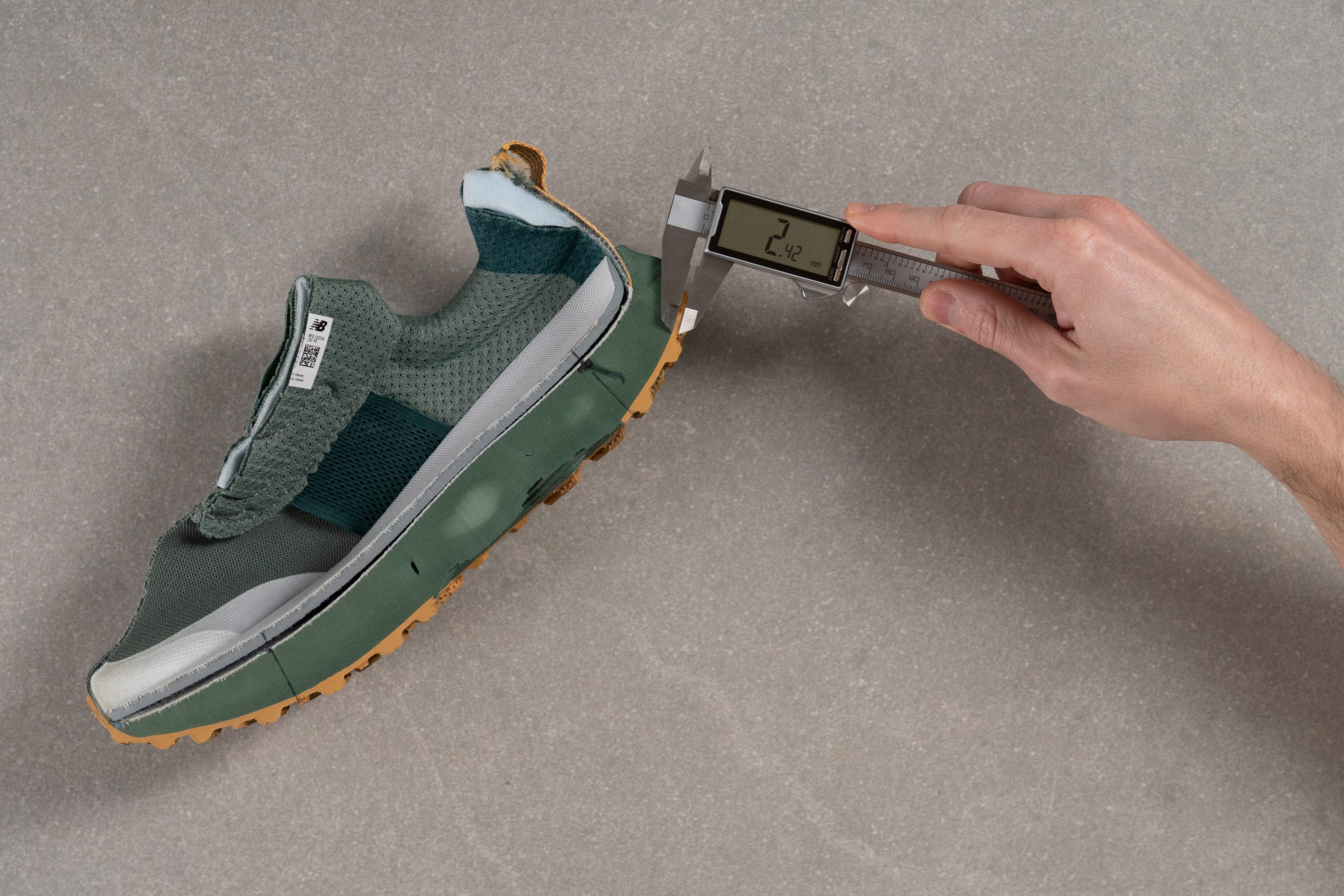
| Fresh Foam X Hierro v9 | 2.4 mm |
| Media | 2.2 mm |
Varios
Grosor de la plantilla
La plantilla es la mítica versión estándar que New Balance utiliza en muchos modelos de entrenamiento diario para correr por asfalto,y tiene un grosor de 4,5 mm.
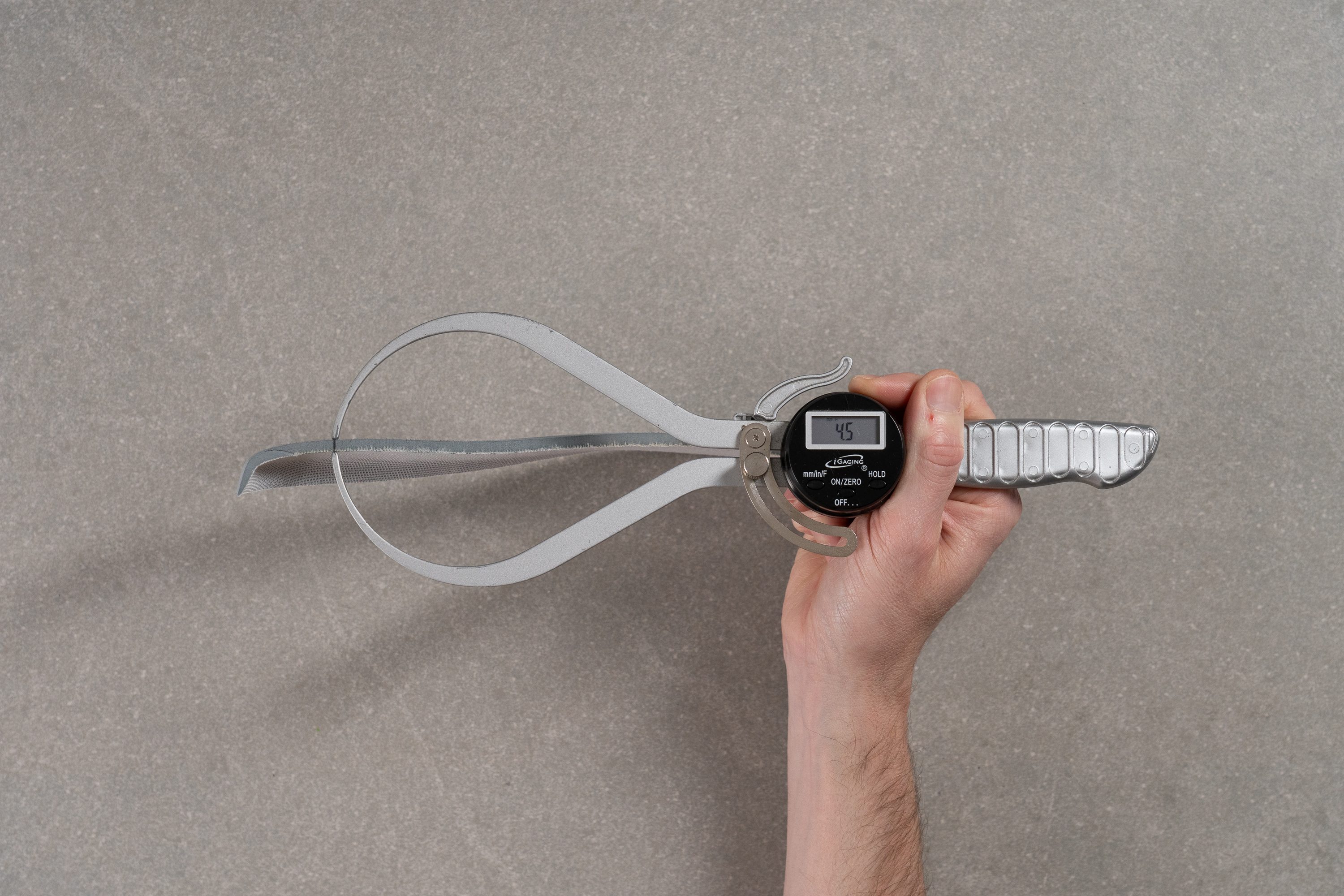
| Fresh Foam X Hierro v9 | 4.5 mm |
| Media | 4.7 mm |
Plantilla extraíble
Aunque tiene un mensaje con el que estamos de acuerdo... la plantilla de este modelo es bastante básica, así que estamos contentos de poder decirte que no nos costó nada quitarla. Vamos, que la puedes cambiar sin necesitas algo con más acolchado o con más sujeción.
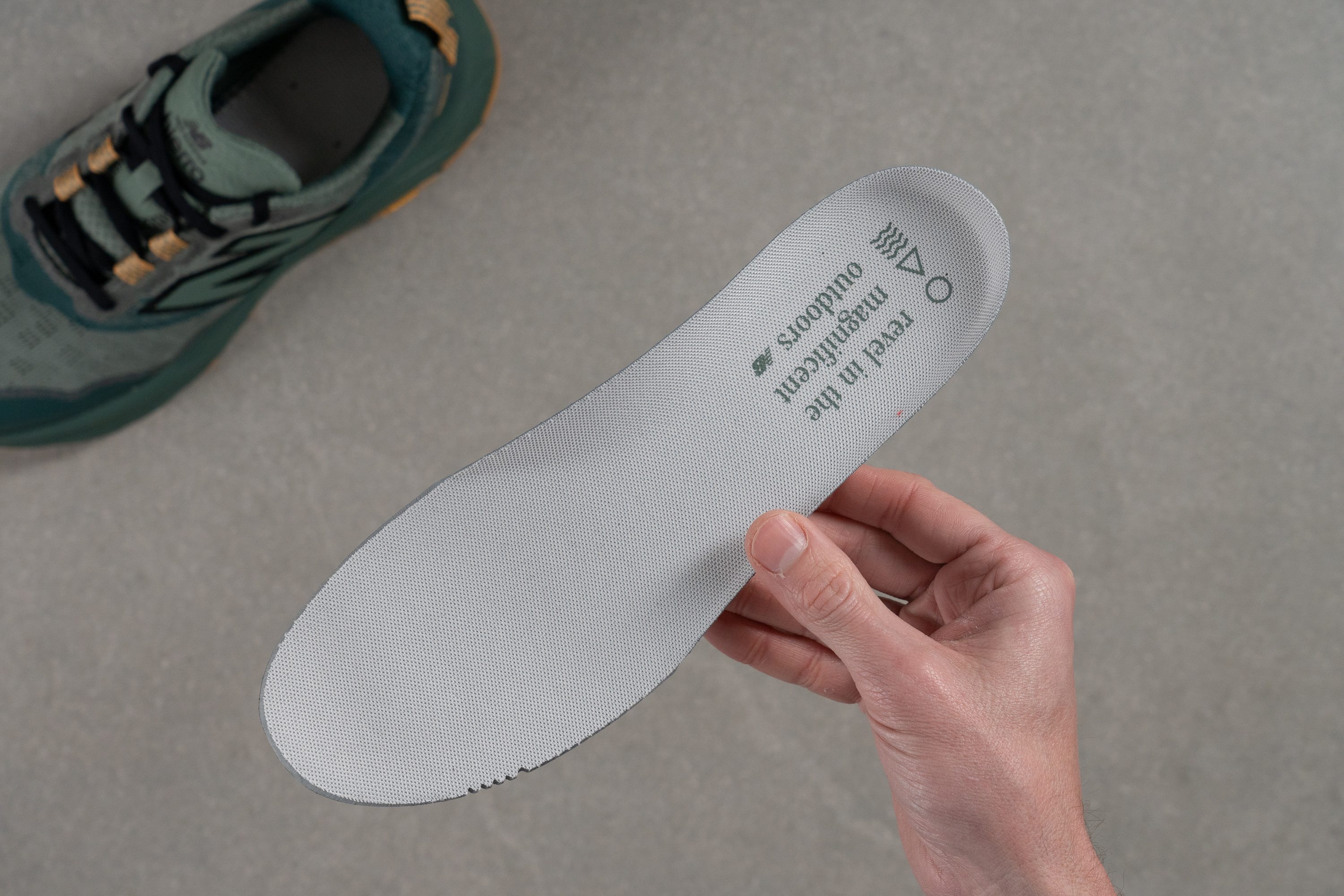
| Fresh Foam X Hierro v9 | Sí |
Rigidez de la mediasuela en frío (%)
Después de estar 20 minutos en el congelador, las Hierro v9 solo se volvieron un 24 % más rígidas. No es una locura, pero nos parece un resultado bastante decente para un compuesto de EVA como la Fresh Foam X.
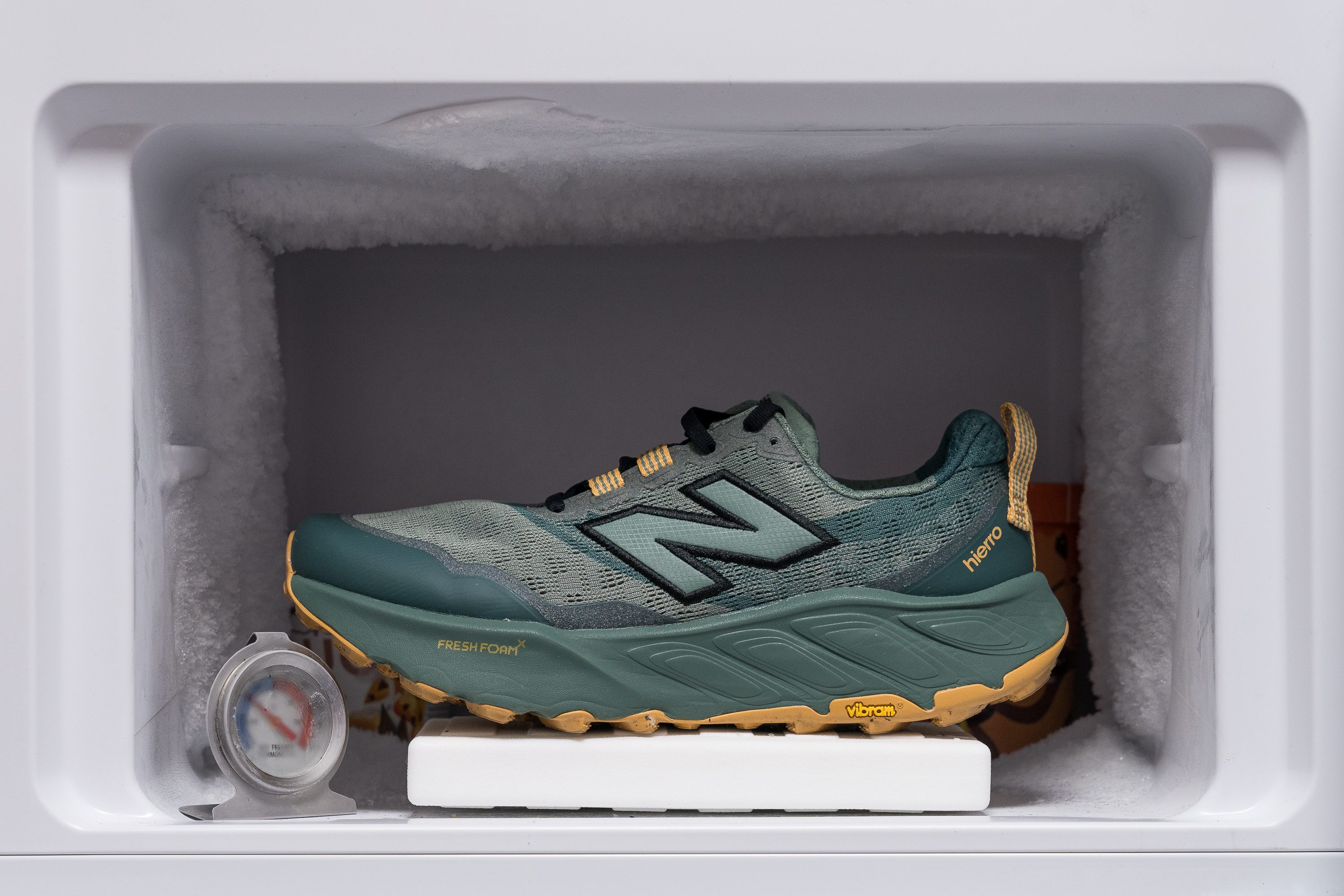
| Fresh Foam X Hierro v9 | 24% |
| Media | 26% |
Elementos reflectantes
Por desgracia, las Hierro v9 no tienen elementos reflectantes, al igual que la v8. Parece que a New Balance no le encanta la idea de echarles una mano a estas zapatillas de trail con la oscuridad de la noche.
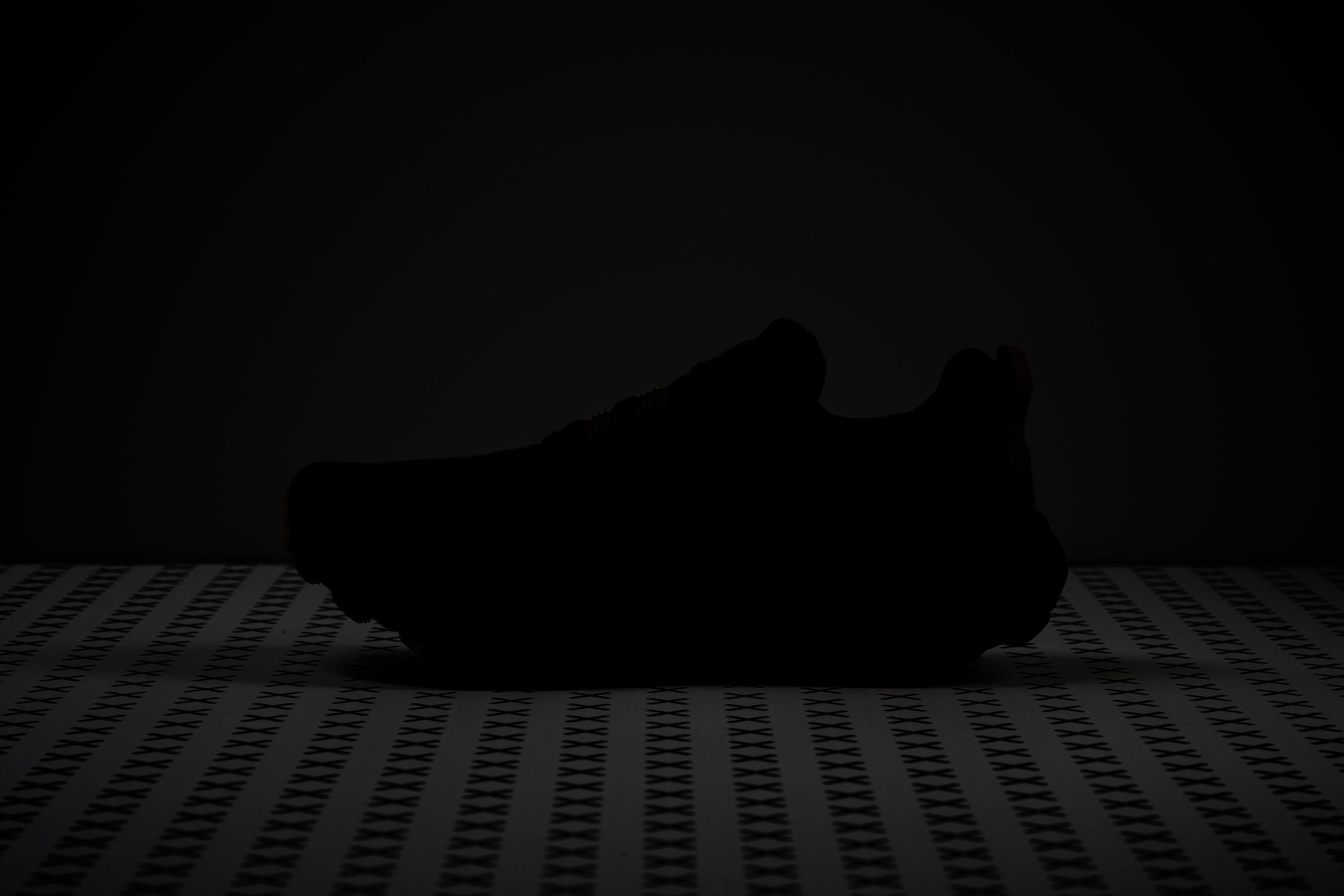
| Fresh Foam X Hierro v9 | No |
Acolchado de la lengüeta
Las Hierro v9 tienen un sistema de cordones resistente y preparado para el trail, con cordones anchos y planos que pasan por bucles grandotes y con relieve y ojales reforzados. Un lacito en el medio de la lengüeta mejora la estructura, ayudando a que esta se quede en su sitio en los movimientos más dinámicos.
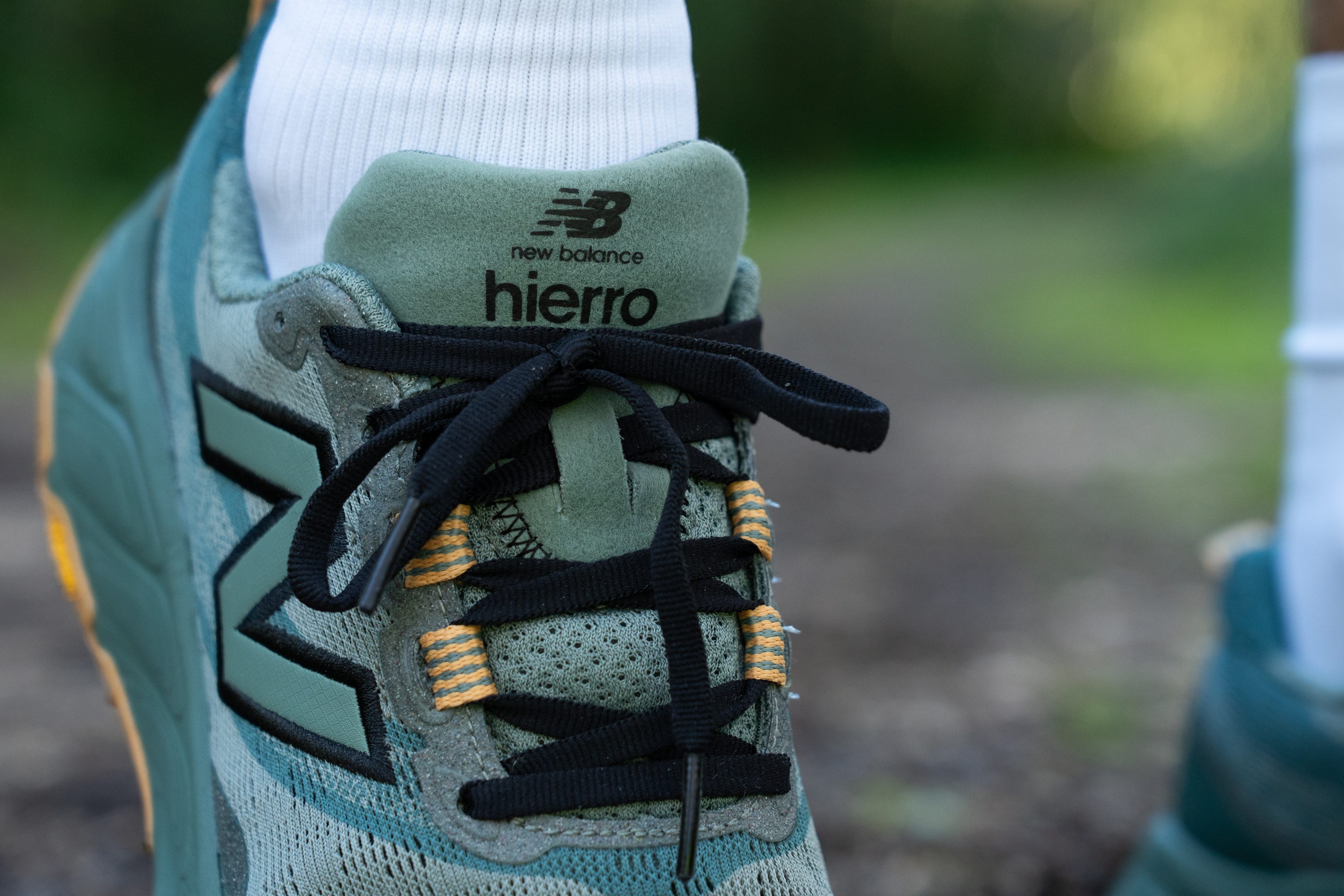
La lengüeta está bien acolchada, y sus 7,2 mm nos parecen suficiente para las rutas largas y con muchos obstáculos. Eso sí, que ponga "hierro" ahí en minúsculas no es un detalle que nos encanta... parece que lo pusieron a última hora.
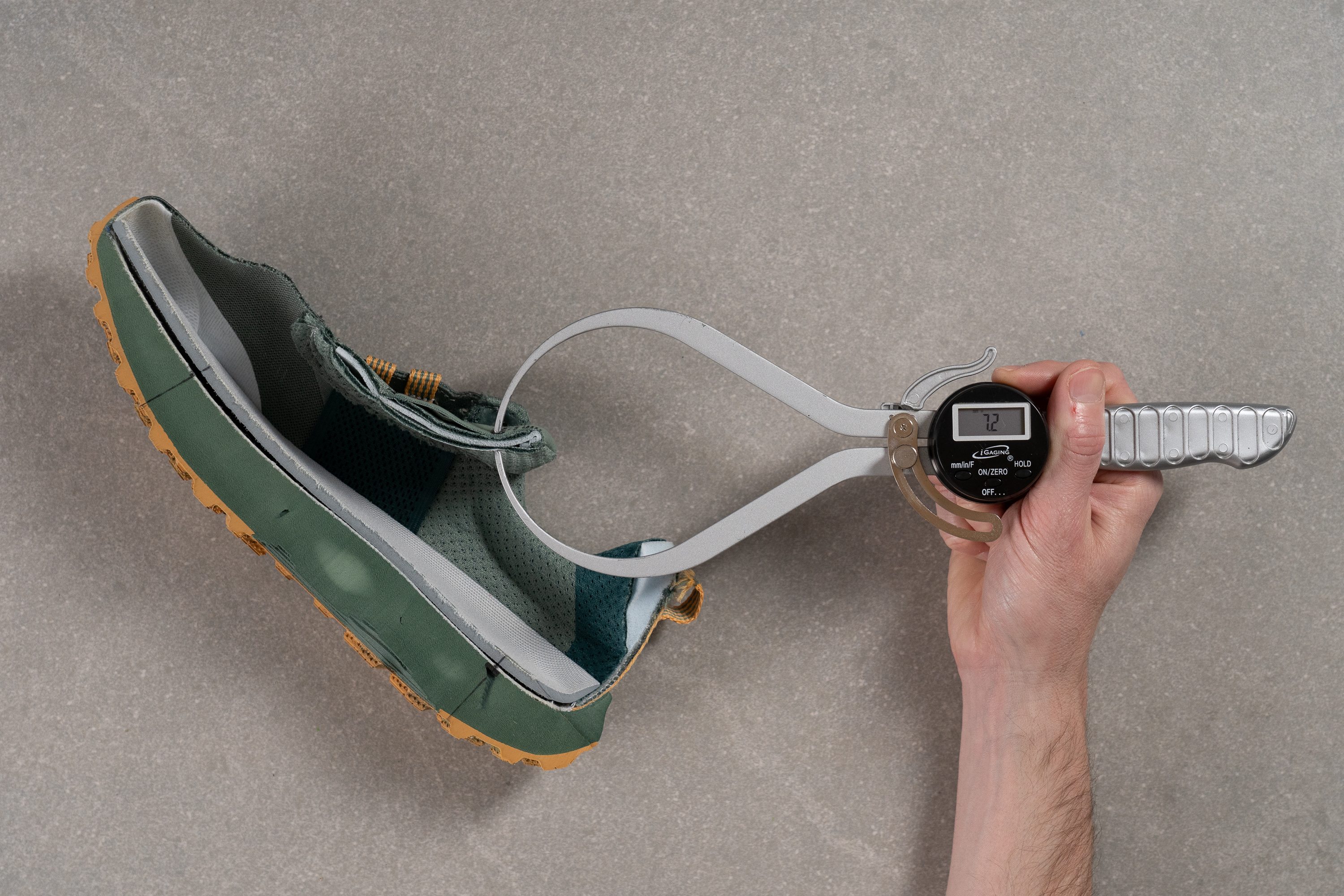
| Fresh Foam X Hierro v9 | 7.2 mm |
| Media | 6.4 mm |
Lengüeta: tipo de refuerzo
La lengüeta está semi reforzada. Es una buena opción para el trail running, ya que impide que las piedrecitas y la tierra se cuelen en las zapatillas y mejora el cierre, evitando que la lengüeta se mueva a donde no queremos.

| Fresh Foam X Hierro v9 | Ambos lados (semi) |
Tirador del talón
Otro cambio respecto a las Hierro anteriores es el tirador del talón. La marca lo ha rediseñado, cosiéndolo asimétricamente en el lateral para que sea más resistente. Pero bueno, es un poco rarito de todos modos, ¿no?
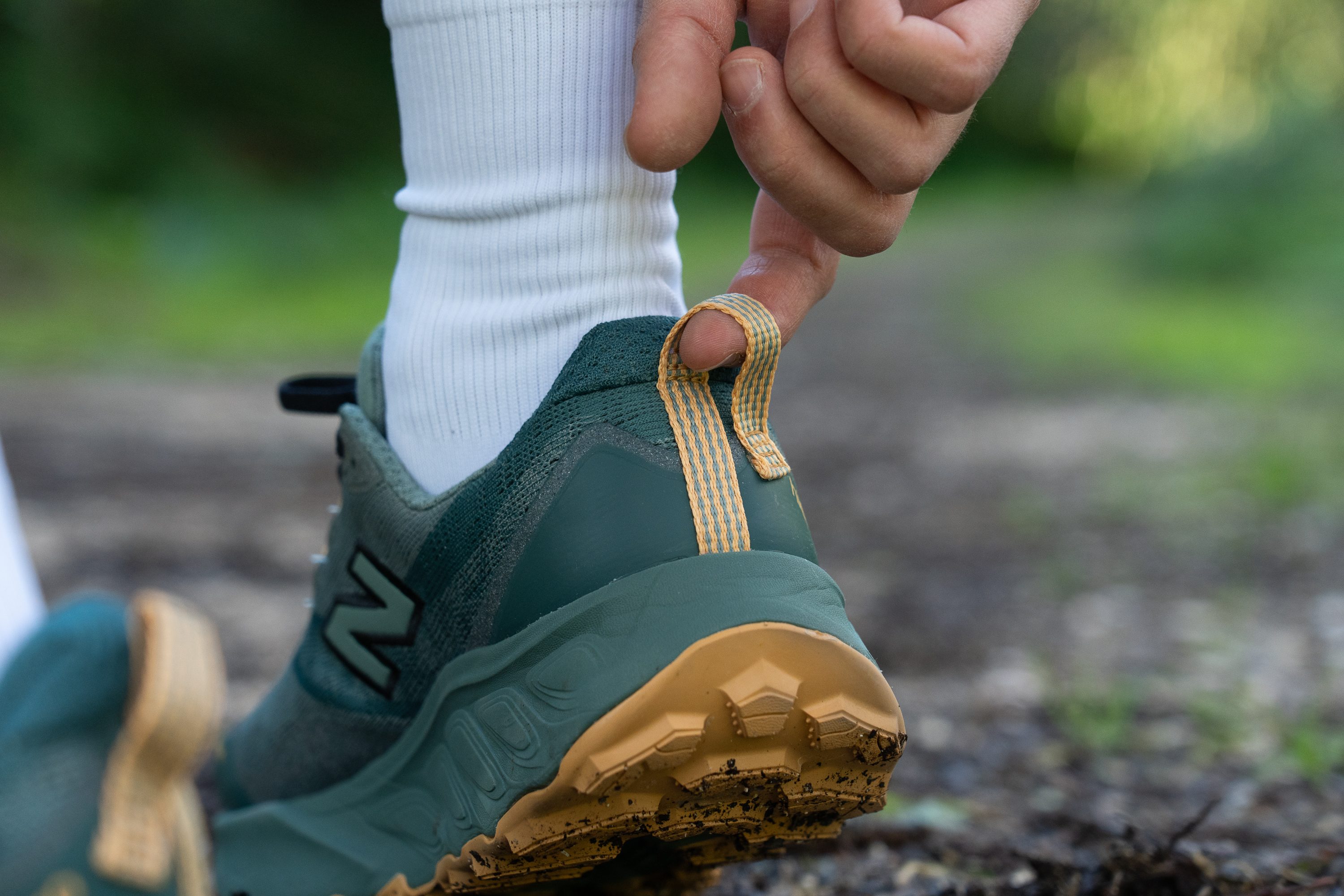
| Fresh Foam X Hierro v9 | Tirador circular |
Precio
Hay un pequeño salto de precio desde las Hierro v8, y eso nunca nos hace ninguna gracia. Pero... sí que nos parece justificado en este caso, ya que este modelo tiene mucha más espuma y una suela exterior Vibram Megagrip mejorada con un montón de agarre.
| Fresh Foam X Hierro v9 | $155 |

